Registered Nonprofit
Association for the Support
of Children and Needy
People Around the World
Unterstützung
Earthquake region in Nepal
Sat, June 25, 2016 - 7:50pm, written by Fenja, published by Frank
Final report - day 12 and 13 – May 22nd, 2016 Kathmandu
Department of Education
Today we will drive to the Department of Education, 40 minutes from Kathmandu to obtain the documents required for the construction of the school. Mingmar by the way tells us details about the country and the culture. He describes an area on the border with China by the name of “Mustang”, which is still very original. Despite the monsoon season which just starts, all year hiking is possible there. The houses there have only very small windows for people believe that otherwise spirits could penetrate the building.
We step outside the hotel and walk down a small muddy lane to a greater road where we find two taxis to take us to the department. The cars are small so that we have to pull our knees tight to the body for there is only very little space behind the driver. We are driving about one hour across the different districts of Kathmandu past many piles of rubble which have remained untouched since the earthquake. Many buildings will probably not be reconstructed within the next few years and many people have lost everything.
Before a large gate the two cars stop. We get out, stretch our legs and walk to a large brick building. A woman and a man, both in uniform, greet us and let us pass. On the building, the Nepalese flag is blowing in the wind.
We step into a large hall, only sparsely illuminated by the daylight. It is cool and the corridors ahead are extinct. Only rarely someone crosses our way. Our Nepalese friends are eagerly walking ahead. Then we turn off and follow Narayan into an office. Soon after we leave the office again, wander through the corridors and are sent from one office to the next. None of the officials seems to really know where we have to go to get the necessary documents for the school. Eventually we are taken into a simple office with the floor covered by a yellow carpet. We have to wait some time until the official has time for us, but then he speaks to Mingmar in a very determined way and Mingmar translates. He explains that there are 25 different designs for schools that have already been approved by the government. Still, we can choose an engineer and have him design something for us; however, this will additionally complicate the procedure. The official asks where the school is to be build and Narayan Bohora explains that in the rainy season the water comes up to the ankles of the children. After a long discussion in Nepalese, the official sends us to another office where the documents will be issued. Again we walk across the cold stone corridors looking for the right room. In a large office which is divided by partitions into small workplaces a woman in a sari sends us to a Western looking man who speaks English well and takes time to explain the situation. He mentions that since the earthquake the procedures have changed significantly and that we now have to go to different offices to apply for a number of documents. There is now the “National Reconstruction Association” which tries to coordinate all reconstruction work. He explains that the procedures are constantly redefined and that currently nobody really knows what documents are needed and which buildings are approved and which are not approved. He writes down for us the names of the other offices which we have to visit and shows us the already drawn up plans. Upon our question for a rough cost estimate for the school he answers that this might vary a lot. The various regions of Nepal have easy access to different raw materials which does influence the kind of building and also the location plays an important role regarding the cost. Provided the place is easily accessible and there are many raw materials available at low cost, the building cost will of course be lower than elsewhere. “The cost of the same school building located east and west of Kathmandu would already differ significantly”, he says. “But before you can decide on the construction, you have to apply for other documents."
Equipped with new information, we leave the building. As we walk over the dusty courtyard, we discuss how to proceed. Our time here is over and we still do not have the documents that would allow us to build the school. Narayan and Narayan Bohora look at us sadly realizing that we will not be able to apply for the documents during this trip.
We find it just as hard as the two to accept that the school building cannot be started this time. We decide to have our Nepalese friends continue to take care of the documents and we can send them the necessary documents from Germany. In addition, we already plan our next trip to Nepal to take place in August and will then also visit Naya Shanghu. They seem relieved and promise to do their best to prepare the documents. The next morning we meet on the corridor and help carry down Fenja’s luggage, where we meet Mingmar. He will also leave today. Alexandra waves from the hotel as Mingmar and Fenja get into the taxi to the airport. Alexandra will continue today to India, to organize the distribution of shoes, school uniforms, etc. in schools and to support needy children in the streets of Delhi…
THANK YOU, THANK YOU, THANK YOU to ALL friends at home who shared the thrills of this trip with us! Only with your support the work of FriendCircle WorldHelp will be successful!!
Fri, June 17, 2016 - 12:40, written by Fenja, published by Frank
Report of day 11 – May 21st, 2016 - Kathmandu
Departure of a part of the team
After only a few hours of sleep, we rush frantically through the hotel halls and rooms to gather the last pieces of luggage of Jürgen, Susanne and Alois who are flying back to Germany today It is five o'clock in the morning and already getting light as we say goodbye to the three. We hug and look a bit sad after the taxi. “I’ll definitely be back!” Alois says.
Together with Mingmar, who does not want to refrain from accompanying the three, they drive to the airport. A last message reaches us from Susanne, Jürgen and Alois already sitting in the airplane and on the verge of leaving Nepal.
Planning for the next few days
Later this morning Fenja and Alexandra are sitting together with both Narayans and Mingmar to discuss the schedule of the next few days. Today is Saturday; therefore, we are forced to wait with the processing of the documents until tomorrow. Similar to the European Sunday, many shops, offices, pharmacies and restaurants in Nepal are closed on Saturday. The streets are empty and Kathmandu almost quiet today.
Narayan II, the parents’ representative of the school in Naya Shanghu tells us that we have to drive to another town near Kathmandu to have some documents filled. Since today we have more time, Alexandra takes a FriendCircle WorldHelp calendar and a Newsletter from her pocket and we tell about our work in other countries in the world. Our friends are astonished to hear about poverty in Europe, as the local media do not report on this.
After a long and intense discussion, we wander through the streets looking for an open pharmacy to buy drops for Narayan’s very red eyes. Finally we find one and then leave our friends.
Together with Mingmar we go to an Internet cafe to send some reports established by Fenja as well as photos for our website. Mingmar also leaves after a while since after his long absence he would like to spend some time with his family. After work is done and a small dinner we step out on the street and with some luck – our sense of orientation is not so good – we reach our accommodation...
Wed, May 15, 2016 - 9:35pm, written by Fenja, published by Frank
Report of day 10 – May 20, 2016- Jareber, Kathmandu
A long drive back to Kathmandu
Outside it is still dark as we get out of our beds one last time and collect our things in the light of flashlights. At 4 in the morning, on time according to German standard, we stand ready to depart in the yard of Bishnu’s house. The farewell is relatively unspectacular because we all are tired and happy to finally sit in the jeep and continue dozing.
While it is getting light outside we are shaken in the jeep. Nepal wakes and as we struggle with the fatigue we see more and more people in the streets going to work. There is only little traffic so far. We see a policeman on a small stool in the middle of the road reading the morning newspaper. Though there are not many cars, buses and trucks on the road so early in the morning, we drive past two major accidents. Puzzled, we point to the barrier in the second accident. Instead of pylons or a warning triangle people have placed small branches and trunks on the road. On the side of the big truck green leafy branches have been inserted into the tarp to prevent other drivers from driving too close by the scene.
We drive across the Nepalese mountains, past green rice fields and brown rubble. In a bright field where the rice just starts to grow, there is a huge sign, an Indian advertisement for noodles – a simple picture showing one of the problems of the globalization.
Then we stop at a large service area, buy mangoes and spiced chickpeas and stretch our legs a bit. Jürgen shows us how to open the mangoes on one end, knead the mango well in the hand and then drink the pulp.
Shortly after we have decided to continue our drive, the jeep stops again. A long line of colorful trucks, buses and jeeps snakes up the mountain, but none is moving. "There is often a jam before Kathmandu", Mingmar says and estimates that we will need about 1,5 hours to reach the city. This time we do not fall for his prediction and prepare for a 3 hours’ driving time. The engine of our jeep is chugging loudly while we are waiting. Since it is not likely that we will continue in the near future, Alexandra asks the driver to switch off the engine but Fenja objects: "Then he will not be able to start it again by himself" (for each time the little brother of our young driver has to switch on something behind the open hood to make the engine start). Nobody reacts – a clear sign how much we have already grown accustomed to life in Nepal – nobody is really surprised that our car does not start without external help; something that would be unthinkable in Germany.
Women carrying heavy baskets on their backs walk slowly past and look at us. We talk about Nepal and the fact that we just notice that here it is not the year 2016 but 2073. However, no one is really sure about this because on another invoice we read the year 2072. Mingmar does not know from which important event on the years are counted here.
Meter by meter we creep forward while the sun rises higher and higher. After two hours in the slow-moving traffic and a very short distance we can finally drive again. Over bumpy roads we eventually reach Kathmandu where the noise, the dirt and the heavy traffic takes our breath away. The silence we enjoyed in the mountain villages is in stark contrast to the bustle of the capital.
Mingmar takes us to a Buddhist temple called "monkey temple", which he eagerly wants to show to us. We get lost a bit between the giant golden Buddha statues, the people praying on planks and the numerous monkeys jumping from one building to the other hoping to get something to eat from the visitors. In front of the café opposite the temple we notice an old man. We buy him a piece of cake and he is thrilled and smiles at us as he slowly puts one little bite after another in his mouth..
Once more rain is pouring down on the streets as we drive to our accommodation. We spread our clothes that have become wet on the ride. Together we sit in Jürgen’s and Alois’ room when our friends Narayan and Narayan Bohora arrive who have come by bus to Kathmandu to discuss with Alexandra and Fenja tomorrow about the documents. Very early tomorrow, Jürgen, Alois and Susanne will drive to the airport.
Mon, June 13, 2016 - 10:10pm, written by Fenja, published by Frank
Report of day 9 – May 19, 2016 - Jareber, Naya Shanghu, Dane Gau
Strong women in blue-red saris
"Are you coming, sister?" a young voice asks. We step out of the house and meet Laxmi, a young girl that helped us last year by her English knowledge with the distribution of food. When we left last year she cried because despite of the short time we had grown dear to her. She hugs us and does not leave us. Instead of the usual small bowls of noodle soup we find a number of portable cans on the table for breakfast and Laxmi tells us that her grandmother has cooked for us. We are speechless in view of the rice pudding, the rice bread and a vegetable curry, all of which Laxmi carried down the mountains in a one and a half hour walk. Her grandmother is 90 years old and would like to meet us, Laxmi says. We promise to come this evening if there is enough time left after our work. Until then Laxmi will accompany us today...
Together we walk once more the rocky road towards Naya Shanghu. We notice some equal-clad women. All are wearing red-blue saris. They are members of a women’s association which they founded themselves. They explain that they are collecting money to make available microcredits to all villagers and to buy items needed by the entire village, e.g. urgently needed water lines or simple dining plates – because after the earthquake practically everything is missing. Moreover, the women meet to discuss their problems like poor harvests, lack of water or also sometimes “men drinking too much alcohol“. The association is independent and self-organized, based on the strong will of the women to make things happen. They keep a small account. Each family can deposit each month savings of some 100 Nepalese Rupees, approx. 1 Euro.
Since we are under time pressure, we promise to come again tonight to learn more about this concept.
When we finally arrive in Naya Shanghu, Ram Chandra, one of the parents‘ representatives, is already waiting for us on the street. Today, we are invited to have dinner at his home. Of course, the planned school is an issue – our host tells us that he spent seven years as parents‘ representative on the school. He also absolutely wants to support the construction of the school. We are sure to have found in him a strong helper.
Farewell to our friend Minraj
It rained heavily and the unpaved roads and streets have turned into brown slides covered with large puddles and mud holes. Despite of all this, Minraj, our disabled loyal friend insists to accompany us down to the street. Bravely, supporting himself with a stick and also supported by Jürgen he says: “When you come back, I will need no more stick!” His optimism touches us. In a small shop on the road we buy a solar cell for the old couple on the river whom Alois, Jürgen and Mingmar visited every morning. They live at quite a distance from the village and have always been dreaming of having electricity. We want to fulfill this desire now.
When after a half-hour walk steep uphill we arrive at the little hut of Laxmi’s grandmother, an old, stooped woman hobbles towards us. One after the other she hugs us, kisses us on the cheek or forehead, vividly murmuring a few words with a deep firm voice. Mingmar tries to translate her words. She gives each of us a tiny lovingly made bouquet of flowers and thanks us for coming. She tells about the support provided by FriendCircle WorldHelp last year after the earthquake. The old woman suffers great pain in her foot, but when she had learned about our arrival the first evening she walked all the way down the mountain to greet us. We look at her and are moved.
Slowly it begins to dawn while we try the small round fruits and always more nosy neighbors come to exchange a few „words“ or rather „glances“ with us.
Microcredits and vegetable gardens
In a row we walk down in the dark the narrow path lit by flashlights. We are happy that Laxmi and her friend accompany us for without them we would not have found the return way so easily.
As we arrive, a woman approaches us and we recognize her blue-red sari. The group of women has been waiting for hours for our arrival.
Under the canopy of a hut we sit down and are soon surrounded by many women. The chairwoman of the Women’s Union begins to talk. They do not receive any support from other organizations! Almost all of the participating women work in the fields and keep a few animals in order to ensure the survival of the family as best they can.
“We would like to create vegetable gardens”, one woman says. For this, adequate irrigation is necessary which is currently available only in a few fields. Also, since the earthquake many families are lacking plates and cups, a problem which we have noticed on several occasions. Many times we had lunch in Naya Shanghu one after the other because there were not enough plates.
The women tell us about the “account“ which they jointly keep and which allows them to grant small credits to each other. For seven years they have been collecting small amounts from the women. With this money they pay for shared purchases and grant credits at low interest rates.
We see the books which carefully list who borrowed when which amount and what the actual debt is which in most cases amounts to two to three Euros per family that have not yet been repaid.
A man explains the books and upon our question why he does it, his revealing answer is that none of the women can write. When we decide and declare to pay all due interest rates, joy and relief break out among the concerned women. FriendCircle WorldHelp thereby assumes the payment of some 14,000 Nepalese Rupees, equivalent to 120€. In addition, FriendCircle WorldHelp pays for additional pipes to irrigate the gardens.
It is late at night as we walk home. Tonight we will have only about two to three hours sleep, since already at 4 in the morning we will be picked up by a jeep to take us back to Kathmandu.
Wed, June 8, 2016 - 10:10pm, written by Fenja, published by Frank
Report of day 8 – May 18, 2016 – Jareber, Gorkha
Morning talks
When Mingmar brings Chai at 7 in the morning, we are all on different levels of awareness – Fenja is still sleeping, Alois already returns from a long walk by the river. During our daily noodle soup we learn that the bus to the city will pass by our village only around 9am. One after the other we wash our clothes in a large bowl and hang them in the sun to dry.
We hear that unfortunately the man who owns the stream refuses to share his water with the villagers. We sit down in front of the house with him, his wife and his son and talk a long time, trying to explain him that he will continue to have enough water for his fields and how important the water is for all here. They show no understanding and we are disappointed as we look after them when they leave the yard. We are as baffled as the rest of the villagers. It is, however, clear to us that we will not maintain a line for just one family who refuses to share with the other villagers. Bishnu does not want to tell her opinion because she is afraid of quarrels in the village.
In all this confusion a young woman approaches Fenja, who is just hanging out her washing a bit off and starts talking to her in Nepalese. She shows a large scar extending from one side of her hip to the other and making her abdomen bulky. She cries. Fenja signalizes her to wait and tries to call the attention of Mingmar who is still talking with the villagers. As he arrives, the woman tells that there was a tumor in her abdomen which had to be removed by an operation and again she gets tears in her eyes as she tells about the pain she suffers. Helplessly we stand next to her, trying to give her courage and promise to meet once more the next morning to at least help her with her other worries. She lives in very poor conditions and looks for her three children on her own, her husband working in another state, also for a very small salary.
When the bus drives up honking we decide quickly to speak once more later this day with the villagers and the unrepentant stream owner.
We get into a brightly painted bus which from the outside looks completely full – and in fact it is for our German understanding! Back to back we stand with Nepalese women and men. They curiously smile at us. It is certainly not often that Europeans are on this bus. The tickets cost as much as 40 cents for the six of us. With the numerous curves on the way to Gorkha we train our arm muscles as we cling to the handrails as tightly as possible trying to ignore the unbearable heat and our stomachs that react every now and then with nausea. Eventually the bus empties slowly and we can sit down.
Three black cows lay dormant on the roadside in Gorkha. Their skin shines in the morning sun and they take no notice of the entire bustle around them. Mingmar tells that once he followed on his bike a large bus which eventually stopped driving. Mingmar honked and finally drove past the bus. *Then I had to stop immediately. Before me stood a huge elephant!“ he tells. Fenja and Alois look at him unbelievingly – we cannot imagine meeting an elephant amidst the road traffic.
We go to the shop where we shortly loaded our devices on a battery yesterday. The owner euphorically places our charger cables into the socket, but also here there is no current anymore. We will have to get along with the remaining battery life. Alexandra and Fenja share a bag of noodles which they eat as ‚fingerfood‘ since „to go“ here consists only of a foil. We decide to go directly to the building authority where we will meet with the parents and teachers.
Water is scarce also in Gorkha
We walk steep uphill with sweat running down our faces, and follow a small dirt road between the houses – an abbreviation, Mingmar says. Again and again we have to avoid small piles of rubbish that are accumulating. Unfortunately, also in Nepal a lot of trash is carelessly thrown on the road. Only in countries like Nepal, India, etc. we learn to really appreciate the clean streets and meadows in our home country. As we come to a normal road, there is a long row of large metal containers in front of us. One by one they are lined up all along the road. Besides the many vase-shaped pots small groups of women are talking. We look around curiously and finally discover a few water taps at the end of the line. The women with all these vases are waiting here, in the middle of the city of Gorkha for water. Mingmar asks and is told that the source here once led a lot of water but now due to tectonic movements caused by last year’s earthquake only small rivulets are running from the taps. As we walk further we can see ourselves how slowly the water pours into the pots. It will take a very long time until the last women will receive the much needed water.
Cheaper though still earthquake-proof is in fact possible!
At our arrival at the government building, a large group of people is already waiting. An intense debate is going on. Parents and teachers want this school and want to cooperate with us. They have understood that we will not provide them with a 150,000 Euro building in their small village. But they also see that we are wholeheartedly committed. A father says: “We believe your group. We believe you because you have come directly to us - no government, nothing.“ Another man says: "We can build this school a lot cheaper. We can bring sand from the river – and if the government says that we are not allowed to do so, we will do it anyway."
We feel that here in the heat and on the dusty ground in front of the building authority something has changed in the people’s minds. They start to think about how they can change the system under which they all suffer. "Corruption is a disease everywhere", Alexandra says and all nod in agreement. "We are not here to discuss with the many authorities for days and to be sent from one room to the other and to overcome always new bureaucratic obstacles. We want to help the children and the teachers by creating a safe, dry environment for learning!“
Therefore, it is necessary that the parents and teachers from now on take care themselves to procure the requested documents. This also strengthens their will and the cohesion of the persons concerned, which will also be extremely important throughout the entire construction phase!
"The water line is a prime example of our practical work and of how people can cooperate for a common goal.“ The men standing in a semicircle in front of us listen carefully.
We mention by the way that there have been difficulties with the source owner this morning. Those present become visibly restless and finally suggest driving with us to Jareber later to find a solution with the source owner. We are very pleased by this proposal which shows that people understand always more about the working principles of FriendCircle WorldHelp: "friends help friends“.
Growing determination
In a determined mood we walk up to the office of the officials and are eagerly waiting for what our Nepalese ‘collaborators’ will achieve. We decide to first wait outside the office to make clear that the parents have to stand up for their children and the school building. So we are standing in the small corridor outside the office room and sweat. Every now and then we have to pull together to let pass different officials carrying large piles of documents under their arms. Then Alois calls excitedly and we rush to him to see what he has found. "Electricity. They have power here!" Alois laughs as we find him in a small room with large ceiling fans. A single officer is sitting here patiently filling numerous forms. Quietly we sit on the worn sofas on the side and plug in our multiple socket. Soon Fenja, Alois and Susanne are sitting around the socket on the carpet quickly sending a few messages to their dear ones at home.
Suddenly Mingmar bursts into the room shouting "Quick, now come all." We get up and stumble hastily into the room of the government official, look briefly around and discover Alexandra. She sits already on one of the sofas and points to the free place besides her inviting us to sit down as well. We are a bit messed up and startled and sit down. "What happened?" the official asks looking expectantly at Alexandra.
Alexandra lovingly but firmly explains to the official that our friends at home who donate money for these projects are not rich. "They all work very hard and give from their hearts whatever they can to realize this school here!“
We are still shocked by the amount of 150,000 € mentioned by the engineer. "We will not accept corruption", Alexandra now firmly and directly states.
The official calmly looks at us and says that he can understand this very well and assures us his full support. "I will myself go out and have a look at the work. If you have any kind of difficulty, please come. I will support you!“ the kind administrator promises. We explain the simple, but good quality and earthquake-resistant buildings that are to be constructed. Then we clarify the acquisition of the necessary documents before we say goodbye for good.
Like a miracle – the pipe is buried on the other side of the mountain
When we leave the building, the sun is already high in the sky and we open our umbrellas to protect us against the sun. Mingmar suggests driving home with a jeep but somehow we are glad that the impatient driver does not want to wait so long for us, because his car looks as if it would collapse at the first touch. Eventually we find a normal taxi. The car, however, is so small that Susanne has to sit in turn on Alois’ and Fenja’s lap which is definitely tiring during the half-hour ride. Since she is also very much struggling with nausea during the bumpy ride, she decides shortly before Jaraber to walk the last distance. To be helpful, Alois also jumps out of the car and accompanies her.
It is hot today and the ride in the narrow taxi is not really pleasant. As a precaution against nausea we are chewing Kardamom. Finally we arrive at our accommodation where the court is already full of people. The parents have arrived before us. Mingmar has hardly got out as all begin to talk to him in Nepalese. We finally interrupt the cheerful conversation and ask for the reason of the apparent joy. Mingmar explains that the villagers this morning had thought of another solution and that already another, much richer source was found! A man is pushed by others towards us and introduced as the owner of this new source. We are overwhelmed – this morning the situation still seemed hopeless and now the pipe which yesterday was buried at another place, has already been moved to the other side of the mountain!
We are thrilled and together with the parents and many villagers we walk to the tank and cannot believe what we see. Water is gently splashing over the edge of the tank which is already full! We hurry along the line as we want to see the new source. A much larger river now serves as a water spring. The end of the pipe has been fixed with stones at a deeper level and through a plastic bottle with drilled holes the water keeps running into the pipe. We remain for a long time on the large rocks that line the river bed, starring entranced at the black pipe which transports more and more water down. Together with the men we decide to exchange the remaining 150 m pipe which are no longer needed for the main line, for thinner pipes. These will then be distributed to the villagers for the irrigation of their fields.
As we get back to the great tank we find many women and children already fetching water. Out of sheer joy and exuberance a little water fight starts. Alois being already completely wet Fenja, Jürgen and Susanne are now also being dragged into the water stream and everyone laughs loud when Alois fills his cap with water and puts it on Bishnu’s head. The water sparkles in the setting sun while our clothes are getting soaked. The joy about the water is huge and – especially infectious!
Impact of last year’s massive earthquakes
Together with all diligent workers we cheerfully walk to a small shop – everyone gets drinks and the kids even lollys. Then we sit together and relax, enjoy a cool drink. Again and again we look unbelievingly at the water tank on the other side of the road, where the water lavishly flows. What had seemed hopeless in the morning now seems to us like a miracle in the evening.
We say goodbye to the many people because we want to visit the old, deaf and dumb man who had been so anxious a few days ago fearing that he would get no water from the source. We will go to see him in his tiny hut on the mountain above our accommodation. As we arrive he offers us a simple tea without milk. Fortunately, Mingmar understands the sign language and the man tells us the following: More than one year ago he owned with his family a small, simple house in the mountains. This house was completely destroyed by the earthquake. From the rubble he built the shelter where he lives now, together with his wife and his youngest daughter. Everything is very clean and tidy in the puny little room with clay soil. We can hear a few goats bleat in a shelter.
His wife tells us "This land is rented“ as they cannot afford the purchase price of 50,000 Rupees (equivalent to about 420 Euro). Two older daughters are presently in Kathmandu, one of them in the hospital. The eldest daughter is on the way to India as she recently married an Indian compatriot. The only son of the family is an assistant to the bus driver. (Like in many other countries, in Nepal there is in addition to the bus driver an assistant collecting the fares and announcing the stations.)
While the sun slowly sets down behind the Nepalese mountains, the couple tells us that after the earthquake they received six metal plates as support as well as last year rice and flour from FriendCircle WorldHelp – nothing more. "Many organizations drove by in their cars, took pictures, but nobody stopped here", the woman says sadly. The sorrows have drawn deep wrinkles in her face and we decide to support the family with an extra financial donation. Also, a piece of the leftover water pipes will be laid
Thur, 02.06.2016 - 10:30pm, posted by Frank
More reports will follow - no Internet access
The reports of the last days in Nepal will follow soon. Presently Alexandra has no Internet access...
After the departure from Nepal she is currently in India to supervise further projects.
Kind regards,
Frank
Sun, May 29, 2016 - 1:10pm, written by Fenja, published by Frank
Report of day 7 – May 17, 2016 – Jareber, Naya Shanghu
Water line for the villagers – unexpected difficulties
Slowly, one after the other slips out of his bed. Yesterday, it was late and only after a Chai Mingmar cheerfully serves us we feel awake enough to have our breakfast. We sit on the bed of Alois and Jürgen (due to lack of space they have to share a bed) between the clotheslines and the suitcases and discuss the latest findings of our projects and the conclusions to be drawn.
When we step out of the house to make our way to the school Naya Shanghu there is a crowd of people in front of the house. These are the villagers who today want to continue the work for the water line and are just taking a break. We are pleased to see them and ask them how they are progressing with the trench for the pipe.
Then one of the men approaches us and explains that he owns the source. All the fields around the brook belong to him. He is worrying that he will not have enough water, because the villagers will use so much. We try to calm him down. Because of the collection basin on the road the stream will not dry up but will still carry enough water for his fields. The basin is being filled through the line day and night, so that enough water is available to all, above on the stream and down on the road. The concern of the man again shows how important the water is for all here. No one can do without, and all live in constant fear of not getting any more water at some point. Since the earthquake and the associated ground movements last year, water has become scarce here, and to get to the precious water, people must now often walk far up the hill and carry buckets of water down. Even during our short stay here, we witness the effects of drought. Many times we turn in vain the taps in the bathroom and also the line at the sink is sometimes empty – we then take a shower and wash with buckets of water. There is no toilet flushing system; small buckets of water are used to rinse. We intend to inquire later to make sure that everyone is happy.
Tug-of-war about the simple, earthquake-proof building concept
Hastily we say goodbye to the people as it is getting hotter and we have to walk again to the school to talk with the teachers about their ideas. The temperature today is 37°C according to Mingmar‘s thermometer. We sweat as we walk slowly over the dusty ground trying to protect our skin with hats, scarves and umbrellas against the sun burning down merciless on us. In the shade of a big tree we take a little break and share our water. Mingmar looks at the tree and tells us that it is a Nepalese tradition to plant two trees for a wedding – one for the woman and one for the man. „What a great relief the shade of a single tree can bring", Alexandra says and we nod in agreement.
We continue our walk through the heat and are glad as we finally reach the village. In a small shop on the roadside Jürgen and Alois meet a friend of last year. Minraj is handicapped but we can communicate with him in English. Later he tells us that he just woke up one morning and could no longer move his legs properly – the doctors have been trying since to find out what happened to him – so far in vain. Last year Jürgen met him after many of the 30 tons of food donated by FriendCircle WorldHelp had already been distributed and the team was about to drive off. Minraj kindly asked for a second ration and Jürgen initially refused. "We always try to distribute our rations fairly. But Minraj explained that he cannot work and lives with his sister. He cannot contribute anything to the welfare of the family. Jürgen then went with him to his house and shortly before departing he brought him two more bags of rice.
Minraj is enthusiastic about the reunion and his gratitude can still be seen in his face. He follows us to the school and takes a seat with us in the staffroom. We are eagerly waiting for the headmaster and some of the teachers who are still with the children in the classrooms.
Then at last the gong is struck for the break and the courtyard fills with children in blue uniforms. Now all come together in the staffroom, including Narayan Dani, our helper of last year as well as Narayan Boroha, the parents’ council representative.
We are looking expectantly while Mingmar asks them to tell us the results and proposals of their discussions. An intense discussion arises, everyone leaning forward as nobody wants to miss a word. "We can only build one floor, but with a flat roof", "We can make the buildings smaller, with only six classrooms instead of eight" or "We only go to the government in Gorkha and not to Kathmandu, it's cheaper" different teachers insert into the discussion. The teachers stick to the original concept trying to make it easier and cheaper. We wonder why our simple, cheaper and still earthquake-resistant design is not considered. The headmaster explains that the government has drawn up the plans for this building after the earthquake and promised the entire school community to build it. "But we have been waiting for more than a year!" one of the teachers replies indignantly. "The government says that they are looking for a sponsor for the building." the headmaster replies. We can literally feel that most teachers except the principal begin to understand that they will have to wait for even longer if they continue to rely on the government.
As one of the teachers suggest constructing the building as planned but with a lot of personal contribution for 40.000 Euro – less than one third of the price quoted – we are shocked by this open statement. "This is corruption! “, Alexandra rants. "None of you has so far dared to say that the price of the two two-story building is much too high!" Ultimately this confirms our assumption but we are still glad that we can now openly discuss the issue. One of the teachers tries to pay us respect by repeatedly expressing that all hopes lie with us and our work. "I do not want respect We want you to be honest!" Alexandra says. Based on this, we then try to again explain to the teachers and parent the one-story simple version of a school building. Gradually, all begin to understand how much we want to build this school – but together with them! We do not want to just transfer some money to a bank account, take pictures and leave. We try to make people understand how much we care for all these children in their worn blue uniforms and that is THEM who need our support. "All together must stand up for this school and take over responsibility. It is not enough to sit with the government, smile and exchange some words in English. Teachers and parents must make a choice whether they still want to wait for the building to be constructed by the government or whether they want to fight together with us for their school against the government," Alexandra now says with a resolute attitude.
After a short time all agree to drive together tomorrow to the building authority in Gorkha to talk once more to the officials. We are going to reject the original plan of the engineer, but teachers and parents have to state very clearly that they still want to have a school built in Naya Shanghu. Narayan Boroha, the parents‘ representative tells us that many parents are actually unhappy and repeatedly ask when a school will be built. "We need these parents tomorrow when we see the authorities and they will hopefully say how urgently this school is needed!" We will try to obtain exact plans for the new school building within the next few days.
While the agitated discussion is going on, Minraj, the handicapped young man sits quietly beside Jürgen and watches us. Then he grasps Jürgen’s cap, puts it on his head and puts his own baseball cap with the letters N*E*P*A*L and the Nepalese flag on Jürgen’s heads. "We change", he simply says and laughs at Jürgen. Jürgen enthusiastically agrees and both beam proudly with their new caps into the camera.
Alexandra gets up, counts down some money and gives it to unceremoniously to Minraj right before the eyes of all, saying that we gladly help our friends – whether it is with money, a bag of rice or a water pipe. However, we want to be treated fairly and honestly, because we feel like a big family not like business partners who negotiate with each other.
Minraj holds the money trembling in his hands and cannot believe that it is really for him. Some of the teachers begin to whisper and are visibly glad for the handicapped young man; others obviously cannot really understand what is going on.
Minraj is a loyal friend and since they met again he always stays close to Jürgen. Today he invites us to Chai to his home. Also the children here and their parents and teachers have become so very dear to us that we do not want to surrender to the numerous attempts of corruption and the countless required permits.
We sit down with Minraj and the silent teachers and chat friendly while Narayan, Narayan Boroha, Mingmar and the other teachers continue to discuss. We note that people’s minds are changing and that they begin to understand what we are about.
Toilet for girls – a dark, smelly room without drains
It starts to rain and soon we do no more understand a word with the rain clattering down on the on the tin roofs of the hut which we call staffroom. We are talking about the simple school building and a wooden roof which is to attenuate the noise of the monsoon rain as otherwise it is almost impossible for the children under these circumstances to understand what their teacher says. There is loud thunder and we are glad to have a roof over our heads.
As the weather after a while calms – though only for a few hours- we walk to the small restaurant with a single table where we usually have lunch. Together with some of our friends we enjoy rice and vegetables and as soon as we have cleared all out plates we rush back to the school, dodging deep puddles. The classrooms are already under water. Narayan Boroha tells us that the students sometimes sit on the benches with water up to their ankles. As we walk past a small cement building with doors almost off their hinges and apparently only held in place by a small lock Narayan points to it and explains that this is the only toilet for boys of a school with 450 children – a squat toilet. He shows us another approx. 8 square meters large, dark room. We are horrified when looking inside. "This is the girls‘toilet", he says. There is no ground hole, not even a drain, only small puddles and piles one beside the other.
A delicious Chai at Minraj‘s
The pouring rain finally subsides and we start walking through the dripping wet. The ground is sodden und Jürgen helps Minraj because on the slippery ground it is difficult for him to find a firm grip with his stick. Trying to walk as fast as possible not to get wet through we are as well slipping in our sandals. We buy some more umbrellas and slowly walk to Minraj’s home. Some children join our convoy of umbrellas and throng to us under the umbrellas. Then they run away with their cloths over their heads, as we turn right past a muddy slope, simple huts and water buffalos until we reach Minraj’s house. We take off our wet and muddy shoes and carefully sit down on the two beds in one of the rooms. While the rain slowly subsides, we drink Chai together and Minraj tells us about his life. He shows us pictures showing him as a graduate of university, looking cheerfully and completely healthy into the camera. He had even been married but when we became ill, his wife left him. "Because I am not a perfect person", he says sadly. A bright future lay before him and now he has difficulties to talk and move.
It dawns already as we leave. We must hurry up as we do not want to walk through the darkness. Also Mingmar confirms that this would not be good as in the dark we could easily step on a snake.
Adventurous night ride on the load area of a truck
Back on the road, a big truck just drives past. We run to him and signalize him to stop. Narayan and Mingmar talk to the driver and he finally agrees to take us with him. We climb into the load area and Narayan closes the trunk lid and secures the tarp. As we set off, the metal roads start clinking with a deafening noise and we cling to the supports. The truck jolts over the bad roads and we are thoroughly shaken. Only Jürgen’s flashlight illuminates the load area. We laugh as the situation seems a bit unreal but are glad that we do not need to walk three kilometers home in the dark, despite this uncomfortable transport.
It is already dark when we finally jump from the platform. In our accommodation it is also dark, there is still no electricity. The floor of our rooms is under water as one of the windows has no glass. Bishnu had lovingly changed the beddings. As it starts to rain again Mingmar procures a plastic sheet and nails it carefully to the frame so that it does not rain into the room at night. It cools down and the rain washes away all the hot dust off the houses and streets. We are sitting in the „boys“ room on the beds spooning noodle soup.
Mingmar tells us stories about mountaineering – he is a Sherpa, a guide of treks in the Himalayas. Many from his village work as guides or carriers. „In every second house one or two people have died at work“, he says. Every day on the tour they live with the thought that they could die at any time. Avalanches, steep slopes, lack of oxygen – every day they work at the limit. He has lost many friends or had to carry them down the mountain when they got hurt. We are listening spellbound to his stories. .
It gets late tonight as we talk, laugh and sing together.
Palm sized spiders - evacuation
When we finally leave and all are about to creep into their own beds, we notice a palm sized spider sitting motionless at the foot of Alexandra’s bed. Proudly we show if to the men and Alois must hold out his foot against the animal so as to show our friends at home how big the spider is. Then we realize that we do not want to sleep next to a giant spider. Five Germans and one Nepalese are sitting in the middle of the night in a dark room illuminated by flashlights and thinking about how to evacuate a spider in as safe a manner as possible for all involved. Mingmar brings a large green cloth and all our shouting at the same time – nobody believes that we will manage to catch the spider with a cloth. Susanne brings a big can and we find a creased calendar. Fearlessly Alois puts the can over the spider. He has caught it. However, Fenja prefers to step on her bed looking at the scene from above while Mingmar lies down on the floor to check whether all legs of the spider are secure in the can. Susanne folds a calendar page but it takes a long time until Alois is satisfied with the folding. From time to time we see one of the legs protrude as Alois and Mingmar are lifting the can a bit. As Fenja once cries out, Mingmar says without emotion: „Keep quiet Fenja! Men are men.“ Thus the situation is clear. Eventually we manage to wrap a calendar page around the can and the three men carry the can carefully outside – while we run laughing behind them. "Be careful with the foxes“, somebody shouts in the corridor meaning the dogs which are sleeping in front of our door. One laughing fits follows the other .Finally we are back in our rooms when Jürgen cries out loud. We women quickly rush to the other room and see an equally large spider sitting on Jürgen’s pillow. He tells us a bit shocked that already yesterday night he felt as if something was crawling along his neck. Mingmar again gets his cloth. Alois and Jürgen are worried that the spider might escape as they would have to share the three of them one bed with a giant spider who might tickle their neck. Nevertheless, Alois says that Mingmar should now show his method. He touches his shoulder and asks: „Mingmar, first I must know whether you have ever done this?“ - Mingmar's deadpan answer „no“ makes us again laugh out loud. This second “spider evacuation" is for advanced people because the spider is now sitting half-hidden on the pillow. Mingmar throws the cloth on it and tries to wrap it into it. Before he can react, the spider runs out under his arms. Jürgen grasps a corner of the cloth, throws it again over it, wraps it into it and holds is carefully in his hands. Once more we run past all the sleeping dogs to the courtyard and Jürgen shakes the spider out of the cloth. Though all of us are soon in our beds it takes a long time until we calm down and actually fall asleep.
Thur, May 26, 2016 - 8:30am, written by Fenja, published by Frank
Report of day 6 - Jareber, Naya Shanghu, Gorkha
Jumping for joy over a sickle
Alexandra, Susanne and Fenja are still sleeping calmly in the rare few cool morning hours when Alois and Jürgen are already on the road. This morning they go once more to the river to see the old man who lives nearby in his simple hut. They give him one of the sickles Alois had bought on the way from Kathmandu. "He jumped for joy!", Jürgen tells enthusiastically trying to describe how much the old man was pleased about this simple gift.
We start day 6 in Nepal like every morning with a noodle soup cooked by Bishnu. With the spiciness entering our nose we talk about the last day’s experience and debate how to proceed. We are determined to build a school in Naya Shanghu – the children urgently need a place where they can learn in a quiet and dry environment. We do no longer consider the engineer’s ready-made plan but keep thinking over the idea of Narayan Borohas, the parents’ representative. A simple one-story building made of brick with a light roof construction – this is our idea of the school.
Spontaneous visit of a small private school
A little boy we have often seen here just walks by in his school uniform with a small backpack. When we realize that he is wearing brown pants and a brown striped tie to his light blue shirt, we are thrilled. This means that the boy does not attend the "Sansari" school in Naya Shanghu. We call for Mingmar who asks the boy in what school he goes. "Bright Future Academy", the boy answers and adds that he is just about to be picked up by the school bus of this private school. We are thrilled, look at each other and quickly decide to accompany the boy.
Shortly after, yellow bus stops and honks and we quickly grasp our backpacks, run after the boy and climb into the bus. All eyes are looking at us in surprise, many boys laugh at us rascally – it certainly rarely happens that strangers take this bus. Many girls avert their gaze when we look at them. Gradually, however, all find pleasure to see us struggle to keep balance in the rocking bus. We eat a bit cardamom against a possible nausea and are relieved as we arrive at the school grounds an can finally jump out of the bus after half an hour drive.
Hastily the children spread across the entire site and disappear in their classrooms. We are puzzled as we look around. This private school looks exactly how we imagine our school to be. Simple buildings housing single classrooms, stand on the wide square. Inside there are metal benches and tables, and a blackboard. At the edge of the square there is even a kindergarten. The tiny shoes of the children stand in a row on a small bay in front of the room. The floor is covered with a green carpet. The children sitting on the floor look up in our faces with astonishment as we step into the door frame. They look at us quietly and the teacher friendly folds her hands and says "Namaste".
We wander through the whole area and inspect the different buildings and rooms. Though small, the rooms are adequate and the construction is simple – we are convinced. We want to build a solid school, in its simplicity similar to these buildings. We do not want to spend 150,000 € for an enormous two story building, but concentrate on the overall concept. We consider whether we could also think of a garden with fruit trees with the classrooms so that the large space could be maintained and foreseen for the toilets. The visit to this school gives us new courage as we can see with our own eyes what Nepalese schools look like and we now believe that we can build a similar school.
Very pleased by these new prospects we gathered from the "Bright Future Academy" we eventually leave. We walk on the dusty road ready to stop the next vehicle that drives in our direction.
Almost an hour later we can finally see our accommodation in the distance. It is hot and despite our umbrellas we sweat in the sun. We could not find a vehicle and therefore have to walk all the way back. Slowly we walk side by side, often in pairs under one umbrella and talk. Every now and then the conversation breaks up and we indulge in our own thoughts.
Water – concern number 1
When we arrive in the small courtyard there is a next pleasant surprise: the water pipes have already been delivered. Many of the villagers are already waiting for us eager to start digging for the line. An old man is gesturing with his arms trying to tell us something. Mingmar, who fortunately also understands a bit the sign language translates. The man is worried because he did not “sign” and now fears that he will get no water. We are surprised by his concern and explain to him that there is no document signed by those who will get water. The water in the reservoir will be available to all villagers. He is obviously happy as he understands that he will also have water. Each time we are a bit surprised to realize how urgently the water is needed. Since we have been participating in the rural live in Nepal for some days and nights we understand how arduous it is to carry buckets of water into the bathroom to take a shower or to wash. Bishnu and her family at least have a water line in the yard, so we actually cannot imagine what it means to carry every liter of water with great effort to the own hut several times a day. In many villages we see women and children do their laundry in the public well, because it is already energy-sapping to transport drinking water and shower water to their own house. The villagers want to start to install the pipes soon and we promise to come to the source later this day to see how the installation is progressing. They want to complete work within two days – we’ll see!
Responsibility has to be shared
Susanne does not feel well und stays in bed for a few hours while we start to Naya Shanghu to talk to a small construction company. We also would like to discuss our new idea with the school teachers because it is important for us that a school is built that meets the demands of school life.
Again we sweat under our umbrellas and are glad to finally reach the small shop selling also construction material. We are exhausted as we sink into some plastic chairs in the shade on the edge of the store, which is crammed with all sorts of goods. We decide to have lemonade for refreshment and give everyone who stops curiously a bottle. Soon Alois is surrounded by school children who probably have heard the news that we are distributing lemonade and come running in droves from the school to the village. We distribute until the last bottle ends up in the small hands of a happy child and we have nothing left to give.
The shop keeper tells us that he can provide building material at a favorable price. However, we do not yet want to commit ourselves but compare prices of different suppliers once more when construction starts.
Refreshed and full of hope we go down to the school and into the staffroom. We ask to talk to all teachers and when the break starts, all gather to discuss the actual situation. Alexandra draws a large and a small circle and writes into the large one 99%, in the small one 1%. "One percent of all mankind own as much as the remaining 99 %", she says and asks the teachers to which circle they would assign us Germans. A discussion arises and then one of the teachers points to the small circle. It takes a while for Alexandra to explain with Mingmar’s help that we as Germans are not among the really rich. Each of us is here on his own expense and must save the money for this travel during the remaining year. We are aware that we have more than the people here, and that is exactly the reason why we are here - we want to share and help. However, we cannot build huge buildings at exaggerated prices. We want to be treated fairly and honestly and find together an affordable and suitable solution for us, the teachers and the students!
We have a long discussion, trying to explain that we cannot build a huge building and not even guarantee that it will be earthquake-resistant and ask for alternative ideas. At some point a teacher speaks shyly for the first time saying "There is a lot we can do ourselves." Suddenly all have ideas. "We can get sand and stones from the river." - "The parents will certainly also help with construction when they are not working in the field." We then explain to the parents and teachers that we will come again tomorrow and ask them to exchange ideas and think of suggestions. We feel that people now begin to think about the importance of the school for themselves and their children and how the project can be realized. This makes us happy because we do not want to put a building on the huge square and then disappear. This building shall be a joint undertaking.
Like a miracle – the water line is almost finished
On our way back to Jareber we have a lively discussion about the project and the many people involved and think about what we are going to tell the teachers and parents tomorrow and what will be the outcome of the meeting. As we reach the first houses of Jareber we look at the fields where the water line is to be built – and are speechless!
A lot of people with spades are on the slope digging a trench for the water line which already stretches half of the distance between the source and the reservoir. We are delighted to see the hard-working people who have been working all day together here. Many women are digging and further back three men are already assembling the next pipe to the line. The colorful dresses of the women vie with the green rice fields and all are looking happy though exhausted. We shout that we are going to spend a round of drinks for all and quickly a long row of people starts to move. We run across the fields to Bishnu’s shop and distribute all the bottles that stand in the large shelf. Soon everywhere people sit in small groups or go back to their homes, all of them carrying brown, white and green bottles. To see how much these people are looking forward to this water line and how much efforts they put to have the water tank filled as soon as possible gives us an incredible feeling.
Scrounging for power supply
After a short rest we drive by jeep to Gorkha, because we urgently need to charge at least the main electronic devices and call home. In a small printing shop there is power from a battery and we use every available outlet to charge our laptops, cameras and mobile phones. Unfortunately, there is not enough power and some outlets do not work properly so we can only charge a bit a few devices. In the meantime we discuss Fenja’s report of the first days, correct it and add some details. It is a long way from the notes Fenja takes throughout the day to the published reports with pictures on our website. We invest a lot of time and thought as we want to document the events as close to reality as possible.
Now we are pretty hungry and lucky to find in the dark an illuminated small restaurant where we try for the first time "samosas" – small fried dumplings with a spicy sauce. Sitting crowded together on small benches we enjoy the exceptional meal and agree laughingly to Alois‘ exclamation "My goodness, how delicious!"
In the midst of the darkness – a car break down
With new strength after this delicious meal we walk to the internet cafe where we drink a Chai and continue to exchange ideas about the school project. Sometime Mingmar reminds us that it is late and the driver wants to drive back. We set off and get into our jeep slowly bumping down the hill in the dark in direction to Jareber. Eventually, the car begins to squeak and the driver finally stops. All get out and inspect the car. The little boy who is always accompanying us on the loading space to start the engine with an iron bar tightens the rear tire and we continue. However, the strange noise continues as we drive down the hill and finally we stop again. Again we get out and the two boys start to unscrew the wheel. Alexandra lies down on the back seat and sleeps while the rest of us is sitting and waiting behind the jeep in the light of our flashlights Our driver is now under the car bolting some parts off and on, wearing Jürgen’s headlamp while Mingmar giving him light by his cell phone. It is pitch dark now and we are getting worried. Finally the young driver bolts the wheel back to the jeep and we get in.
He drives carefully and we all are listening whether the strange noise recurs, but there is only the normal engine noise interrupting the song of the countless crickets in the night. We continue and start dozing. Again the jeep stops and the driver gets out. A second jeep stands on the roadside and also seems to have a break-down. The two boys from our jeep stand together with many other men around the other jeep trying in the light of a flashlight to find the cause of the problem. We are still dozing but soon more men arrive and Mingmar tries to convince the driver to continue. It takes a long time to persuade him and we become restless and do no longer feel safe. A drunk man knocks on our window, laughs at Alexandra. Nervously we look at each other. At last, the driver gets into the jeep again, turns the key and – nothing. Our jeep does not start. Now we definitely no longer feel at ease. We are stuck.
Some of the men try to push-start the car but without success. The engine does not start. Only as the driver has the car roll back a long way and all once more push-start with joint efforts there is finally the relieving noise of a starting engine. We are driving!
We lean back and are incredibly happy as we finally arrive at our accommodation. Quietly, we sneak into our room, trying not to wake Susanne, but she of course wakes up and is relieved to see us. Shortly after we are in our beds, however, though it is late it takes a long time until we finally fall asleep.
Thur, May 26, 2016 -8:10am, written by Fenja, published by Frank
Report of day 5
Day 5 - May 15, 2016 - Jareber, Naya Shanghu, Gorkha
An aftershock and : "Man should always think: I can do it!"
This night is incredibly hot. Our hairs stick to our forehead and though we have opened all the windows, we can hardly sleep. Restlessly, we wallow back and forth in the bed while outside the dogs are barking. Late at night suddenly the earth quakes: an aftershock. It is just a small one, but sufficient to remind us of last year’s disaster.
The next day when we get up, it is pelting down. Today the men do not go to the river to see the old man and bathe.
We sit on our beds, drink Chai and discuss the forthcoming days. When we praise Mingmar for his tireless efforts he says modestly but emphatically: „Man should always think: I can do it! ‘With this conviction you can do everything very easily. If you think ‚Oh, that’s difficult!‘ then everything will be much harder.” In our work we experience every day how right he is.
Mingmar tells us more about his work as a mountain guide and explains that anyone who travels to Nepal provides every day work for an average of four Nepalese. We are pleased to hear this because it is important to support the economy of the respective travel destination.
„The jeep is about to come“, Mingmar finally says whereupon we women go walking. Each day is a challenge for us and despite the heat we enjoy walking a few minutes through the nature of Nepal. Like many Nepalese we protect ourselves against the strong sun just with an umbrella. Then we all meet in the part of the huts which we call the staffroom.
Some of the teachers, parents and the principal are already present. Also our friend Narayan joins. They tell us that the buildings that were destroyed last year by the earthquake had been removed solely by the students’ parents. There was no further assistance. They also want to participate in the construction of the new school. The fact that about 150 men and women are prepared to help, motivates us greatly. They are not able to help financially but they are willing to contribute by offering their labor power.
The headmaster hands us over a long protocol in Nepali to be signed by us. We ask for a translation because it is out of question for us to put our signature under a document that we do not understand. Since the teachers need some time to translate the protocol, we do not sign yet. After the meeting we call Frank in Germany because we need a document that expresses our will to build a school. Later we intend to drive to Gorkha to have the document printed. „The sun will shine on this place. This school will be a bright place and become an example for other places in the world. Together we can do it!“ Alexandra says. As we step out of the staffroom all children are already standing on the court in their blue uniforms performing their morning ritual. Today we have to drive to the city to continue the planning of the school building.
Everything is possible
Mingmar and Fenja quickly go to see the dressmaker since every evening Susanne must help Fenja take off her clothes which are so tight that she cannot pull them over her head herself. The young girl in the fabric shop nods and laughs as Mingmar describes the problem. Tomorrow we can pick up the modified top.
On our way back we arrive at a small cluster of people excitedly watching a man running around a cairn hitting the ground with a picket. “A snake – he tries to chase a snake!” Mingmar shouts to Fenja and Alois who have approached curiously. We are shocked as a few seconds later the man holds up a small snake dangling lifelessly in his hand. But Mingmar tells us that this snake and many others here in Nepal are venomous, therefore people are afraid.
In the village center we meet the rest of the team and a few minutes later we get back into the jeep. In addition to the headmaster today Bishnu, our landlady accompanies us to buy in the city pipes for the water line for approx. 22 families. This time Alois boldly takes a seat besides the headmaster on the loading area of the jeep. Shortly before the police station both have to jump off and walk a bit before we pick them up again and continue. The road is bumpy and as always we are sitting closely packed inside the jeep. Alois is thrilled with the fresh wind blowing around his ears on the open loading area. At our arrival in Gorkha we have again to wait for Alois and the headmaster who had to leave the loading space before driving into town.
We drink a mango juice from the pack and go with Bishnu into a small, very crowded shop looking at different pipes. We opt for a good quality, wide tube to make sure that the water line will be long-lasting. The shop owner can give us at once 400 meter pipes. But since we need 550 meters of pipes according to our discussion with the villagers, we ask the owner to ask his supplier how early the remaining 150 meters can be supplied. When we hear that this will take about seven days, we are a bit disappointed. Therefore, an employee of the company heads off to ask in different stores if there is somewhere a larger inventory. After this unsuccessful search we ask the shop owner to revert to his supplier and ask for a shorter delivery time. The supplier agrees and promises to supply the pipes in one day. We are happy about this unexpected turn. Many times we experience these moments when we look at each other with surprise as we cannot believe that everything can be made possible even if initially it did not look like.
Unexpected obstacles – we will not give up!
The pipes are to lead from a concrete tank up to the source at the foot of the mountain which we visited yesterday. At the source a pipe will be embedded in the stream. The water will pass through many small holes of an old remodeled plastic bottle into the tube in order to avoid sand to pollute the water in the tank or clog the pipe. We also buy a large round iron disc with a stern. Questioningly we look at Mingmar who explains that this iron will be heated in the fire and will serve to fuse together the ends of the plastic pipes.
We leave the shop as we want to load the 400 meter tubes only in the evening on our jeep.
We are looking for an internet cafe to print the letter that Frank has written for us from the back-office. With this letter we express our desire to build a school in Naya Shanghu. We will need this letter to get the necessary documents from various offices. We also quickly recharge our electronic devices because in our accommodation most of the time we have no electricity.
We enjoy once more a Nepalese lunch in a small restaurant before we walk up the hill to the building authority office. When we arrive there we are sweaty and are asked to wait for a few minutes since the engineer is still busy.
The Nepalese around us start an agitated discussion when we ask if we can sit down somewhere to continue to work on our reports and pictures. Shortly after we are taken to a shell construction. Over a damp concrete staircase we get to the second floor and Mingmar points to some plastic chairs in a small dusty room. There are two tables with huge piles of documents and four Nepalese who barely look up as we sit down. Almost mechanically they take one form after the other and fill it out with red pens. We cannot read what is written on the forms, but mostly they tick and cross different boxes. One of them is the principal of the school in Naya Shanghu. We try to remove a bit of the cement dust from the plastic chairs, which seems to cover everything here and then sit down. While we are working on the documentation of our trip, Mingmar returns with the "Mutual Agreement" – the signature appears to be really necessary. This time he brings along a short English text, which we are to sign. The content is concise stating that we have agreed with the school administration to build two school rooms with 8 classrooms each. However, we are skeptical about the list of wishes: in addition to the 15 classrooms we shall commit ourselves to build a computer room, a library, a staffroom, a science lab and a fenced-in playground. Moreover, a supply of drinking water is proposed.
Alexandra immediately states that we are not going to sign this agreement. We want to ensure that the children of the Sansari Mahendra Higher Secondary School have a weatherproof and earthquake-proof place to learn but we will not commit for anything further. First we strike out the explicit interior from the agreement but ultimately we decide to set up a new agreement to be signed also by the headmaster and which will include some provisions on our part.
The engineer joins us as we are just discussing to define a gross cost estimate. We estimate total cost of approx. 100.000 Euro, based on the rough estimate of building cost made by the official of the building authority of 75.000 Euro, and since we want to include some more cost for extra work. When we ask the engineer to confirm this amount, he says that 75.000 Euro is the price for one building, therefore both buildings will cost 150.000 Euro. We are speechless. This is a huge amount which in no way we can spend for a school in Nepal – besides, this amount seems far too expensive. Building materials as well as labor are much cheaper here than in Europe.
We are stunned about this turn and ask the engineer about simpler buildings or cheaper constructions but he only answers that other ready-made plans do exist however, we will have to have these first approved the government.
Alexandra calls Frank in the back-office and confers with him in order to obtain another independent opinion on the subject.
We decide not to sign anything for the moment as we cannot understand why these two buildings should be so expensive and why we should have to sign this now. We want to calmly discuss everything over without the engineer who sits in the background on a plastic chair almost a bit insulted and then leaves the room before us.
We discuss animatedly and walk to a cafe, order Chai and sit together to discuss the situation. It is a serious moment; we all put our heads together trying to understand every word. Soon it becomes clear to us that we will not pay this price. 150.000 Euro is a steep price for a school building in a very poor Nepalese village. We put the plan of the engineer on the table scrolling it through again and again and discuss the size and number of classrooms, as the parents’ representative of the Narayan Bohora school timidly approaches and shows us a picture. In English he says: "Perhaps you could construct the building like this?" We are curiously looking at the picture. It shows a stone-wood construction of a single story building.
We are very pleased with the proposal. This is exactly the kind of school that we had imagined: various simple buildings with two or three classrooms and direct access to the courtyard without aisles, staircase, etc. The small picture gives u a new impetus and we continue our discussion until it is already getting dark outside.
Alois draws his idea: the large square in front of the current roofings shall persist and exactly where now the corrugated iron roofs stretch over the last puddles of monsoon and the children are learning, one by one the buildings can be constructed around the square in a U-shape. Fenja suggests visiting tomorrow an existing Nepalese school to get an impression of the standards of schools here. We decide to take enough time for the planning of the building until all agree, as we want to make sure that finally on this place a school is built which satisfies the needs of students and teachers without unnecessary luxury.
At some point the restaurant owner asks us to leave because it is already late and so we say goodbye. On the drive home we continue to discuss the number and set-up of the classrooms, the number of students and teachers and all other relevant data.
We sit together over our plates of spicy noodles and discuss about the high price, the two stories building that nobody really needs and the reasonable suspicion that somebody intends to make money out of our volunteer work. Alois interrupts our conversation with his enthusiastic exclamation "This was really good!" – though we are eating every morning and almost every evening this kind of noodle soup which actually is just an instant mix that Bishnu refines with some onions and spices, but we enjoy it each time.
When we finally disappear in our room, wash ourselves in the glow of flashlights and change, all bad feelings experienced in the building authority’s office at noon are gone. We are convinced about our new concept and willing to stand up for it already tomorrow. We want to build a school for the children in their worn-out blue uniforms!
Sun, May 22, 2016 - 7:30am,written by Fenja, published by Frank
New reports
Day 3 – May 13, 2016 – Naya Shanghu (place of the school), Jareber (place of our „hotel“), Gorkha
It is pleasantly fresh when we wake up the next morning. Birds are singing not only outside our window but also in the middle of our room, because there is a small nest of swallows on the ceiling. Susanne gets up early and goes for a walk and the men get up and go bathing to the river Darodi. We finally meet all with a plate of noodle soup for breakfast and all enthusiastically tell about their morning. Susanne enthuses about the openness of the people here and the many great moments she experienced during her short walk. Jürgen and Alois tell of an old man who lives down by the river and who showed them and Mingmar a suitable place to swim in the cold water before he invited them to have Chai in his house. “He used fresh buffalo milk! “, Alois says. “The man also invited us to have lunch and intended to slaughter one of his chickens, which he repeatedly had to chase out of his house. We rejected with thanks. In high spirits and with a delicious soup we start this day.
When Narayan finally arrives to pick us up, we quickly pack up our small backpacks and leave. He tells us that we have to walk some 3 kilometers to the place where with the help of FriendCircle WorldHelp a school is planned to be built. We walk past the place where we had been welcomed yesterday by all these wonderful people, and Jürgen and Alexandra tell us that last year they camped right here after the heavy earthquake.
Already on the way we meet many children in blue school uniforms. They accompany us all the way through. „What’s your name?“ we are often asked and the children run happily around us. We are a bit puzzled as it seems that there is already a school.
Narayan points to some new shiny tin roofs and explains something to Mingmar in Nepali. Before Mingmar can translate Alexandra understands and laughs happily. "These are OUR roofs! These are the corrugated iron roofs we bought last year! Jürgen, these are OUR roofs!“ she exclaims. We are excited and walking further we see again the corrugated iron roofs donated by FriendCircle WorldHelp shining on the small huts. We repeatedly point to them, show it to each other and are happy. Yesterday people told us that our help has saved so many lives – today we can see it at daylight. It is an incredible feeling which we hope to be able to bring home to Germany. Because WE all have saved these lives here, all our friends at home and around the world.
Eventually, the children turn off and we continue to the end of the village. Suddenly, Narayan shouts to turn left where a small stony road takes us back to the side of the village to some small tin huts. On a large square we recognize from far the blue uniforms of the children. As we get closer, we are soon again surrounded by the Nepalese children. They are playing jumping games, running around and throwing Frisbees or colorful rings. The square is lined with simple tin huts without walls. Bamboo constructions hold the corrugated iron over many metal benches and tables stand close together. Rubble and stones are scattered everywhere around the huts. Only the large square in front of the huts is free.
We immediately understand why it is necessary to build a school here. Mingmar tells us that in winter the temperature falls to -5°C – but the lessons of course continues. We cannot imagine what it means to sit in the cold and rain in these tiny huts trying to learn different verb forms of „to be“ .
We are asked to come to the staff room where all are respectfully folding their hands saying „Namaste“ as we enter. We reciprocate the gesture and sit down. The head teacher introduced himself and the teachers look at us curiously. Normally, the lessons start at 10am, therefore the headmaster takes us to the courtyard where already all 350 children present today are standing in rows according to size and gender. Upon the English spoken instruction of a senior student they stretch out their arms to all sides and then say together the morning greeting – with one hand on their heart. A little girl stands in front of us. She closes her eyes and firmly presses her hand on her heart, her dark braids held together by a bright red band bounce while she fervently speaks words we do not understand. We only understand the word “Nepal“ from the melodic singing.The headmaster says a few words of welcome and we are given a white scarf colorfully printed with many Nepalese characters. Mingmar later explains that this is a Nepalese welcome gift.
Now the headmaster describes the situation after the earthquake. „Many aid organizations have come to Nepal and have asked a lot of questions. They spoke a lot of words but no action followed. What we need are actions, not words“, he explains in Nepalese. He says that we will earn their life long respect as they put all their hopes in us. Alexandra then says that we do not want to wait any longer. “Let us start right now, not tomorrow“, she says. When Mingmar translates, everybody is laughing in disbelief. The teachers assure us that no one will interrupt our project, but all want to help. “Nobody will stand in the way of your project“, one of them says to us in English. All are incredibly grateful, although we have not even started the construction. Involuntarily we lower our heads a bit, feeling almost ashamed of so much gratitude shown to us for our mere presence.
Alexandra says that it is the second time that we are in Gorkha and describes the first trip after the earthquake. When she asks who remembers her and Jürgen, many children raise their hands. They remember having received water and food. „Nepal is a wonderful country“, Alexandra repeats twice before addressing directly the pupils: „and you are the future of this country!“. She asks the children whether they want a school. First they hesitantly shout some words but after we know how to say „I want a school“ in Nepalese, we shout - „Homelai school boneidenus“ together with the 350 children of the Sansari Mahendra Higher Secondary School. Then the teachers send them to their classrooms because the lessons begin. The small huts and the narrow metal benches are filled with children sitting close together with hardly room for their feet. The age of the students ranges from four years up to 17 years in the last class.
We go back to the staff room and discuss the next steps. Together we will now drive to Gorkha to meet the engineer and the responsible government official. Standing on the open terrain, we discuss how the new school should look like. Several buildings are planned with 15 classrooms to provide space for 450 students and their 18 teachers. The teaching of different age groups presently takes place at different times since there is not enough space for all students in the buildings. Today we do not meet the senior students. Their teacher, Madhu Bhattari, explains that they are presently in town to pass an exam.
On the way back to the village we walk past the bamboo hut that serves as a classroom for the older students. The headmaster tells us that a Swiss who had come to Nepal for a round tour shortly before the earthquake built it with his own resources. When he saw the suffering of the people after the earthquake, he renounced his journey and donated the money for the construction of these buildings. It motivates us to see how much a single person can change – because we know that unlike him we are not alone as we have a huge circle or friends who all want to change something together with us.
We take a short break with cold drinks and Chai and sit together with our friends. An old man enters the room and Narayan introduces him as his father. Alexandra exclaims: “I know this man! I photographed him many times last year. He was very friendly, always thanked and smiled gracefully and modestly. However, I did not know that he is your father“. The old man repeatedly folds his hands and looks us straight in the eyes. Long after he has left, we show Narayan our Newsletter as he had asked about Michael‘s „medical camp“ in the region of Sunkhani and suddenly all are pointing to one of the pictures. They have discovered a picture of Narayan’s father.
After the jeep has come “just after” (according to Nepalese time), we drive to Gorkha. Some of the teachers, the headmaster and our friends Narayan and Mingmar accompany us. With four persons it is again very narrow on the rear seat and with two of us sitting beside the driver there is really no more place in the jeep. Narayan and the teachers climb onto the loading area. We are hardly a few meters outside the village as it starts to rain again. Narayan and the teachers are crouching close together under their colorful umbrellas trying to brave the rain and the wind.
The country life in the mountains of Nepal is passing by our windows. Next to the river there are many rice fields shining green next to the river which winds its way to our left through the valley. Below a bridge some men have driven their bus in the ford and wash it with large bowls of river water. A few houses down a man is fixing a bus sitting upright below it.
Suddenly we stop. The driver signals the passengers on the loading area to get off. We continue and we are looking around a bit puzzled. Mingmar explains that we will now drive past a police station and that it is not allowed to transport people on the loading area. A few curves down we stop again and wait. Soon we see the headmaster run towards us. They climb again on the loading platform and we continue.Nepalese people are clever and always find a way to evade rules that make no sense for them in their daily life.
Sometime later we reach the paved road that leads to Gorkha. In the city which seems to us strangely full and hectic in contrast to the quiet country life that has accompanied us today since we got up, there is another steep uphill road. We arrive at some high, simple buildings that almost look like a construction site. After some discussions our Nepalese friends take us to the first floor into a room, obviously the office of an official. A simple green carpet covers the floor of the bare room and a tidy man sits behind the only desk in the room. He is the one to decide whether a construction project can be implemented. On the wall behind him is a huge map of Nepal, otherwise there are a lot of chairs in this room which serves as office and waiting room. On a small side table there is a red thermos. We understand its use only when one of the waiting persons takes it and has some tea run in his mouth, of course without his lips touching the jug. Mingmar demonstrated us this way of drinking already the first day in Kathmandu. It allows everybody to drink from a bottle without exchanging our bacteria. Different men respectfully approach the desk, hand over a wallet or plans and talk to the officer who looks at them very calmly. Every now and then he does phone calls and it takes quite some time until we can present our project.
Mingmar introduces us, but the official first wants Alexandra to step forward and introduce all of us in English. She mentions her name and then introduces one by one the whole team. The official has a reserved but benevolent look at us. Alexandra shows the letter of thanks of the Nepalese government for the work done by FriendCircle WorldHelp last year and hands over a pennant of the city of Bamberg which our friend Maria had picked up in advance from the Mayor Andreas Starke. The officer is very pleased by the greeting from the Bamberg Town Hall and says in English that he will support our project. The details are discussed in Nepalese with Mingmar translating for us into German. “The documents are no problem, I will help you to have these issued“, the officer says. Despite this, many things remain to be discussed and Alexandra describes how important it is to have the whole-hearted support of the official – not only the documents. The gentleman smiles and for a moment the uniform he wears seems of no importance.
He promises to issue the documents as quickly as possible and allows us to immediately start construction after all documents are processed. It will take some days until all documents are filled out here in Gorkha and we will once more drive to Kathmandu to get the remaining forms. We presently cannot foresee how many documents actually have to be filled; however, our Nepalese friends already promise to accompany us to the offices and to translate. This shows again how much Mingmar facilitates our work here since he is able to translate directly from Nepali into German which is a huge timesaver.
We are satisfied and go into the adjacent building, together with the engineer who will present us the already completed plans. We ask about the seismic safety of the buildings, the planned construction phases and try to understand the room layout based on the plans. Eventually we agree on the plans of the engineer and decide to start with the preparatory work tomorrow. Two large buildings are to be built over a period of two years. Each building will accommodate a total of eight classrooms and two floors. Sanitary facilities will be built separately. For security reasons we will build two separate buildings. Mingmar promises to stay on site during the initial phase to survey the construction work. Furthermore, we intend to come regularly with small teams from Germany to Nepal to establish the statements of account, review the progress, document the work and redeploy money. Overall we currently expect cost for the planned construction to amount to an equivalent of 100.000 €. Every free moment we think about how we can best manage the project and how we can make it best known. Already now it is clear to us that we will all come back – latest in two years, to celebrate the inauguration together with the students, teachers and parents.
We go back to the officials and take a picture on the roof of the building – all together with the pennant of the city of Bamberg and the flag of Nepal. This flag is the only one in the world that is not rectangular but consists of two triangles that stand for the mountainous landscape. The sun and the moon mean: "As long as the sun and the moon exist, Nepal will persist".
Back in the car and driving across Gorkha, Alexandra suddenly exclaims: „Stop. Stop, there is someone I know from last year.“ As the driver does not stop fast enough, we jump out of the still moving car and Alexandra runs after the old, hunched man. He recognizes her and they greet each other. When we reach them, they are already discussing what we should buy for his family. We decide for a large 25-kilo bag of rice which the man is happily wearing on his back up the mountain. “He earns only very very little and has a family to feed”, says Alexandra who knows the man from her last visit to Nepal.
It is already past 4pm when we finally find time for a late lunch which today consists of fried noodles in a small restaurant in Gorkha. Across the street is a gas station with only one pump. Mingmar thinks that it is probably broke because at least 30 motorcycles with their drivers are waiting to fill their tank. We drink a mango juice from the pack and enjoy at least one plate of the delicious pasta. On the walls of the restaurant are posters showing Sydney and slogans such as „The real joy is freedom“. They seem strangely out of place here, same as the large poster of a white baby next to the door leading into the garden.
After the meal we have Chai and are about to leave when Mingmar tells us that the car has not yet arrived. Jürgen and Fenja decide to have a second Chai since everybody tells us that the car will ‚just‘ arrive which always means that it will take longer. The road is blocked. Narayan is enraged and tells us that some roads further down an accident has occurred and a child died. Mingmar says that when someone dies in traffic this always causes plenty of excitement. Sadness and recriminations, discussions about indemnity payments, all is being discussed right on site.
Our driver thinks we can still try to drive past the accident. However, the closer we get to the accident site, the more cars are driving towards us and people suggest us to turn back. We discuss briefly and turn back – there is another way which Narayan describes as „a bit dangerous“. But we have no other choice as people tell us that today it will be impossible to get through. Since we do not want to spend the night in Gorkha we choose the other way.
We drive a bit uphill in the city until we turn left where the way leads steep downhill. The roads are no more paved and soon very simple clay houses line our way. People look at us curiously. There are certainly rarely Europeans underway on this road. And soon this “road” is no more than a sandy path full of potholes and waves. In the car we are hopping back and forth, hitting everywhere our knees, arms and legs and glad to sit so close to each other that there is not enough space to slip out of our seats. Always again the road leads extremely steep down and instead of trees and the distant horizon we only see the steep road ahead through the windshield. Jürgen discovers monkeys in a tree and all are laughing at Fenja’s desperate attempts to drink from a water bottle.
We drive past red clay houses with bright blue shutters and women and children in colorful clothes waving to us from the roadside, while we are busy on the bumpy ride trying not to bang our heads together. At some point we have to reverse down the hill as the streets run in close zigzag and we would otherwise later have to reverse the remaining mountain. We are tensely looking through the rear window. Everything works well and soon we drive again forward across holes and mud and laugh of this crazy situation. “You experience always something new“, says Alexandra.
About one hour later we reach the valley and drive again past the river where a tractor is being washed, back to our accommodation. We are relieved as we jump out of the car. We drink Chai and Mingmar shows us how he is doing the laundry, naturally by hand and with a bar of soap in a bucket of cold water. As it gets dark, we sit together and enjoy the soft evening breeze, discuss the program of the next few days until our conversation strays and we are talking about our experiences here and our lives in Germany. As I am writing this report, ants race over the table and I lift my hands startled, as a small cockroach walks across the keyboard. Right next to us the landlady is cooking dinner while the kids as always are standing behind me looking curiously at the screen. A few houses down a woman sings.
Alois calls Mingmar, but he is just eating. So Alois brings an old man to us, who tells us that his house was totally destroyed during the earthquake and that he still lives in a tent with his wife. We promise to come to his house tomorrow. Happily, he hugs Alois.
Day 4 – May 14, 2016 – Jareber, Naya Shanghu
Through the small window hole in the one square meter house of our „rain shower“ as we call the cold water bucket lovingly, we can see already early in the morning women in colorful saris working in the bright green rice fields. Freshly showered, we stretch and slip into our Kurta Surual (traditional national costume) and put on the Soal (scarf) – and so at least we women are ready for Chai and a noodle soup for breakfast. Today the soup is quite spicy and we are all sniffling a bit from the effect of the spices in our nose. We are still sitting on our beds sipping our soup when Mingmar calls and shortly afterwards stands in the doorway. The excavator has already arrived at the school and we should start immediately as soon as we have finished breakfast.
Again we walk three kilometers to Naya Saku, today without the company of the children in blue uniforms, because it is Saturday and there are no classes. We sweat, today the sun is high in the sky and burning the dry earth. Each time a bus thrusts past we go beyond the street side and try to breathe in as little as possible of the dust raised and the exhaust gases. Fortunately, there is little traffic.Alexandra and Mingmar are running ahead, but we take a shortcut and arrive at the school shortly before them.
In addition to the excavator operator Narayan and many teachers are already waiting for us. We speak with one of the teachers who has been teaching English at this school for 14 years: “I can no longer listen to their beautiful words“, he says resignedly as he talks about all the organizations that had come and spoken so many words but no action followed. "I am so happy that the work now really starts", he says. We promise to suit the action to the word because we are not her just to take pictures and then leave again.
Then we earnestly address the problem that we have to fight repeatedly against possible corruption. On various occasions we had to fight hard to defend our donations, because there were many times people, organizations and even governments who tried to seize our donations. We would never allow this because this would mean that we lose control over where the donations of our friends go to. We distribute 100 % of all donations, donations in kind and financial support to people who live in great distress and need help. This makes it all the more important to check over and over again where every Euro and every jacket or each tent is donated. That is why we go ourselves to the shops to buy whatever is needed and finally distribute it ourselves on places where the donations are really needed.
A big yellow excavator stands on the large dusty terrain. It is hot today and as the excavator begins to clear away bricks with his big shovel red dust clouds are swirling around. Women and children from the neighborhood stand on the edge of the school grounds curiously watching what is going on. When we notice that many of the bricks break, all together start loading the stones with their hands on the shovel. Although the terrain is extremely steep and impassable, the excavator driver manoeuvers his vehicle with great skill between the piles of rubble. The bricks belong to a family who is nearby building a small house. As the woman realizes how many bricks get broken she almost starts to cry. Fenja immediately notices her distress and we promise to naturally replace the broken bricks. She is relieved but only reluctantly accepts the 1200 Rupees that we pay her. This is an equivalent of about 12 Euro – a tiny amount by Western standards, but her reaction tells us how much money this means to her family. We attach great importance on the fact that no one is damaged by the construction work and repeatedly ask Mingmar whether the situation is now alright for everybody. He nods and reassures us. „She was very unhappy that many bricks got broken, but now she has enough money to replace the bricks – she is happy“, he says.
As a reward for all children and adults who helped carry the bricks in the hot sun, we go together a few steps to the village center into a small shop and buy Sprite for all – a total of 70 bottles is distributed to the hardworking volunteers and to all those who otherwise come over. We are sitting in the middle of laughing children and old women who are glad to leave their heavy baskets for a while and enjoy a cold, sweet drink. After paying we quickly walk back to the site because the excavator has of course continued digging in the meantime. Instead of the small beaten track we had followed a few minutes ago, there is already a gaping hole. The big shovel is digging more and more dusty earth piling it up to big heaps which tomorrow will be picked up by a tractor. We sit down in the shade to work on the photos and the report for our friends at home. At some point the excavator covers us with dust and we move to one of the makeshift classrooms. Sitting on the small wooden benches, we realize how urgently new classrooms are needed.
The soil is both dusty and uneven and where the rain water flowed into this morning, there are still muddy puddles. In the monsoon season the water often stands up to the students’ ankles. Mingmar thinks that teaching takes place anyway, since there is no alternative. The narrow wooden benches are bolted to the tables.
The hands of the many children copying what is written on the board have sanded the wood very smooth. The board is a small whiteboard which is no longer really white and barely large enough to write down a whole sentence.
A little girl who was just crying bitterly comes sniffling and shows me a pen refill she found. I give her my notebook and she paints beside me. Jürgen imports the photos that he made with his mobile phone onto Alexandra’s laptop and immediately all children gather around him looking curiously at the screen. Every now and then they exclaim in Nepalese „That’s me!“ or „Look, that’s my older sister!“
This is the first day when we have lunch already at 1pm – it feels almost a bit strange. „Well, the food - just fantastic!“, Alois says like virtually every time after eating. After the obligatory Chai we go back to the school. In the meantime, the excavator operator has cleared a large area. Next to him there are large heaps of rocks and all the dusty earth. Slowly the area for the new "Sansari Mahendra Higher Secondary" gets even. After a final picture for our friends at home we leave. Tomorrow we will come back to further monitor the work and prepare some documents we need for Kathmandu.We walk back to our accommodation and change clothes as we want to take a short bath in the river. We search a way between many rice fields and often we have to walk on narrow earthen walls so as not to bruise the sensitive seeds. Down by the river we part ways because the women will not bathe together with the men. We women take off our pants but out of respect of the Nepalese culture we keep our long Kurta Surual on and lie down in the shallow stream. It feels incredibly well to flush all the sweat and dust from our skin. We wash our clothes in the river and sit down on the riverbank to dry in the sun. Alois and Jürgen sit in the river with Mingmar and the old man who invited them the first morning for Chai, pouring buckets of water over their heads and splashing each other with water – like little children.
Refreshed by this bath, we continue writing our reports, establishing statements and sorting photos. It is important that our friends at home can follow what we are experiencing here and for what we are devoting our efforts.
After a presumably last Chai – without milk – we have dinner and are about to leave to see the old man Alois met yesterday evening. Bishnu Maya Baneya, our landlady asks why we want to help just this one man. In a determined but respectful way she says that a new water line is needed for the village. “Why don’t you help us all? A water line would help us all“, she says. We ask her to show us the place where the water line should be built and she takes us there at once.
We walk a bit along the road and then turn onto the fields. Soon we arrive at a large concrete block, a water tank. Standing on it and looking through the small opening, we are confused as we cannot see any water. Bishnu explains that the water line should lead up to this point starting from a source farther up the mountain. “Take us there“, Alexandra asks.
We walk across completely parched rice fields with big cracks in the soil. After a few minutes walking the fields are wet and at some point we have to walk around the fields. We carefully walk on the muddy edges jumping from stone to stone across a small stream. Bishnu stops, crouches down on a rock and forms a shell with her hands which she uses to draw the water from the stream and lets the water flow down her face. Here, the water line should begin.
Meanwhile, more and more villagers have come and we discuss the ideas of the people. They want to have the line under the ground and dig the hole themselves. We suggest leaving tomorrow for Gorkha to buy tubes. “We need big pipes which do not break“, Alexandra says. Bishnu says she knows where we can get these. We will take her to the city tomorrow.
Walking back, we estimate the approximate distance. We assess about 600 m of pipes to lead to the water tank on the road where all villagers can get water. We have already experienced the water shortage at Bishnu’s when during our showers there was again no tap water. Many times running waser is only available a few hours every day. Many neighbors come to Bishnu to wash in her basin for she has still relatively large amounts of water.
15 men can help with the project, the villagers say. We ask how long they will need. „Two days“, Mingmar translates. We look at him doubtingly and ask again „Yes, two days – we are all going to help“, one of the men says. We are excited and announce that we will organize a "celebration" if we really can complete the water line within two days.
As we go back to the street across the rice fields, the sun is just going down and paints the sky above the Nepalese mountains red.
Then we visit the old man we got to know yesterday evening and are amazed about his „tent“. Together with his wife, several water buffaloes and chicken he lives in several simple bamboo huts. We ask further and learn that he has five children, all of them living abroad, and also many fields. Mingmar pinches his arm and the man feels caught and laughs. In fact he was lying when he told us that he lives in a tent. His dwelling is simple, in Germany we would certainly call it “poor”. He sleeps on a bamboo mat on a bed frame and on the dirt floor is a small cooking area where his wife every day prepares a sparse meal. Both are wearing worn clothing and go barefoot. The houses of many farmers were completely destroyed by the earthquake and now they live in self-built huts. Since we cannot build a new house for every family, we explain that we want to help all villagers by building the water line. He invites us to have Chai and we discuss with him and other villagers the new water line. We tell them that we have first to drive to town to clarify what the line will cost. We do not want to promise anything yet – but all are optimistic because the idea seems feasible. We drink our tea again with fresh buffalo milk sitting on bamboo mats in front of the hut in which a small fire burns and hear in addition to countless chirping crickets the water buffalos behind us in the stable peacefully chewing grass.
Alois and the old man from the river sit together on a small bench until the old man gets us, hugs Alois for a long time and then says goodbye. The men agree to meet tomorrow for a swim and the old man disappears with his dog in the dark.
We too walk slowly back to our accommodation and one after the other goes into his room - the three men in one room and the three women in the other room. This was a long, eventful day. Eating a noodle soup with the intention to help a man living in a tent, slowly another idea has come up without our noticing it. Now we are going to build a water line and thereby help the whole village.
Sitting alone in the dark in front of the house - power is out again- Fenja describes the last hours of this day. Eventually a little girl sits down beside her and repeatedly lights her own flashlight when Fenja would look up something in a notebook. As Fenja gives the little girl a pen, together with her brother she writes many lines in Fenja’s book.
The children have long ago gone home when Fenja gets up to go to bed and notices that the girl has written something in English:
Name: Garima Thapa
The name of my school is "School for a Bright Future".
Room No: 13
Class: Two
Teacher: Supriya Thapa
Day: Saturday
Fri, May 20, 2016 - 10:20pm, written and published by Frank
Another phone call – reports and photos will follow soon
Tonight there was again the possibility of a telephone exchange with the team in Nepal. After a few days of „radio silence“ since in the mountain villages there was no electricity available to charge the mobiles and of course no Internet access, presently all five are back in Kathmandu.
While Jürgen, Susanne and Alois already fly back to Germany tomorrow, Fenja and Alexandra will stay a few more days in Nepal to continue the work. Reports and photos will follow soon as there is now again power for mobile phones and computers available. 
There are many impressive experiences to report...
Best regards to all of you,
Frank
Tue, May 17, 2016 - 10:15pm, written by Fenja, published by Frank
Kathmandu; drive to and arrival in Jareber (near Gorkha)
Day 2 – May 12, 2016
Our day starts with a cold shower from the bucket. With a small cup we draw the water and pour it over our heads. With the cold and the Chai for breakfast we are by now completely awake – and ready for day 2. Susanne tells of the moment when she woke up this morning. “The birds chipped outside my window and I heard such a quiet, peaceful music. I felt like in heaven“, she enthuses.
We have breakfast on the bed of Jürgen and Alois while Mingmar entertains us with many interesting stories about life in his country. He tells of the cooperation between Nepal and India and describes the moment when last year the borders were closed. “All our clothing and food come from India – therefore, everything is a bit more expensive than in India“, he says. And since for political differences nothing could any longer come across the borders, the prices rose extremely. A black market emerged. “At the gas station we were waiting for three days to get gasoline. We stayed there, ate there, slept and waited. All this for 3 l gasoline, as we did not get more. Some 500 motorcycles were waiting there. The owner always said that he does not know when the gasoline will arrive,“ he says. "At that time you had to pay on the black market 800 Rupees for one liter of gasoline" – the equivalent of about 7 Euro per liter.
As we sit on the beds, drinking Chai and eating our pancakes it starts to rain outside. Mingmar explains that here in Nepal everybody believes that it is a good sign if it’s raining before work like the construction of the school building starts. Also the transport of a corpse seen by chance is thought to be a good sign. We are glad that we only see the rain outside our window.
Eventually we decide to start despite the rain and pick up our new clothes in the city. We are looking for our umbrellas and jackets while Mingmar wraps himself in a bright red poncho reaching unto his ankles. The roads are muddy and slippery and full of colorful umbrellas which we constantly try to avoid. Today the streets seem even narrower because pedestrians and motorcyclists are trying simultaneously to dodge the many holes that have turned into giant puddles.
Today many small shops are closed because of the rain but ‚our‘ dressmaker is already smilingly waiting for us. Susanne and Fenja are pleased with their new clothes and can hardly wait to try their new dresses. We give the dressmaker a small tip because she worked so quickly and reliably and promise to come back next time.
Heading back to the hotel searching our way avoiding the many mud holes seems endless. In our accommodation we have to quickly pack up our things because Mingmar has already ordered the taxi. Susanne and Fenja are thrilled to show their new clothes to the others. Also the Nepalese guests in the hotel are enthusiastic about our clothes. After all luggage is loaded and everyone has paid for his room, we board our jeep which will take us to Gorkha. The four of us are sitting on the small rear seats as Mingmar introduces our driver and new friend Prabhu. We drive off with Prabhu confidently struggling through the traffic chaos of Kathmandu. The drive today will take about seven hours for about 160 kilometers. We almost cannot believe and inquire with Mingmar who explains that we will drive to the mountains with many serpentines and that the roads are very bad. Shortly after leaving Kathmandu we understand what he meant. Again and again we have to take sharp turns between huge potholes and before each tight curve Prabhu honks.
Sometime we stop abruptly. Prabhu gets out and lifts up the hood. We have a breakdown. Ultimately it turns out that the spring of the rear tire is broken. Mingmar agrees with Prabhu to have the car repaired here since this is the last chance for many hours’ drive to come. We use the little break for a Chai, but finally we have two and three Chais for Prabhu seems to have disappeared. We walk through the small road where we left the car and meet an old woman who smiles at us friendly. Sitting on her little cart she is selling fruits. Waiting for Mingmar we can talk to her a bit. Many wrinkles cover her face. Upon our question, she tells us that she is 61 years old. She says that she is not so pretty because she has worked so hard all her life. We contradict her – for when she smiles the sun seems to shine a little brighter. In our opinion her age makes her look even more beautiful. "Every wrinkle tells a story“, Alexandra says. She does not want to be on a picture together with Alois since she is afraid that someone might think that they have an affair. However, we can convince her to be photographed together with Susanne and Fenja and she warmly laughs at us when we sit down beside her. Then she gives us some bananas for which we want to pay. But she only accepts exactly the amount the product is worth and refuses to accept even one more Rupee. Later she cuts a mango with a small sickle and serves us the pieces on tiny skewers. We spend quite some time sitting with her and rejoicing in her honest laughing.
Alois walks down the street a bit and gets to a small forge. As we carefully approach, many of the men sitting around the fire immediately get up and signalize us to sit down and proudly show us their work. Some coals are lying on a simple furnace into which a woman is slowly blowing air until the coals are glowing. A man holds a piece of iron into the coals and forges it carefully with a big hammer and then knocks it into a wooden handle. Later we come back with Mingmar and buy two sickles for a total of about 16 Euros.. We say goodbye as Prabhu finally drives up the repaired car and we move on. A few minutes later Alexandra says that she has to go to the bathroom. All laugh but a little later one after the other Susanne, Alois and Fenja feel the same need. We stop and are relieved as we get out: There is a small restaurant! After all have visited the toilet we decide to stay and have a late lunch. Again we are delighted with the food that is served friendly. From the small restaurant there is a magnificent view of the valley where a river makes its way. The river is called Trisuli. We can see some women working on the river bank and on a small rocky island in the river stands one of these brightly painted trucks and many men working outside. We ask Mingmar what they are doing. They are collecting stones from the river for the reconstruction of buildings, roads or fences for the steep slopes along the mountain roads. “This is very hard work“, Mingmar says. They are paid 600 Rupees a day or about 5 Euros. 400 Rupees are needed daily for food for their families and themselves. “They eat only rice and lentils as this is cheap and filling. They never get anything else“, he explains. 200 Rupees per day are left, which means not even 1 Euro, if the family only buys food.
After all are fed, Mingmar urges us to continue quickly because the families in the village have been waiting for us since 10am. We had tried to have them go home, but could not prevent them from welcoming us the following day. Yet we cannot imagine how much it means to them to receive us. At least the adults are sending many children home now as we will only arrive when it is already dark and many families live around nine kilometers away.
Prabhu suddenly belts up again which means that we will soon meet the police. After the next curve we first see only a few men in uniform, then more and more sitting in big police cars. We are wondering what is going on but only when we drive over a bridge we know the reason for the high police presence. Approximately in the middle of the bridge there is a gaping hole in the bridge railing. We can easily imagine the extreme forces that must have acted on the thick metal pipes until they broke. Such forces can only come from a fast-moving large car crashing at full speed into the railing and down the slope. We are horrified when looking down the river valley some 100 meters deep. “So many police officers are only present if many people have died,” Mingmar says and turns repeatedly to the accident site. We continue without stopping – here we cannot help.
By and by we get tired as the long journey is exhausting for all of us. We hardly talk and try to find a comfortable seating position to sleep. Mingmar talks in Nepali with our driver Prabhu, and we stop in a small village. Mingmar assumes that here we will meet Narayana, our last year’s friend, as already a tall Nepalese comes to our car and welcomes us joyfully.
We buy two large boxes of apples as we want to bring something to all the people who have been waiting for us so long.
We follow Narayana who proceeds ahead with his motorbike out of the village. Soon we leave the paved road and our car bumps over the stony ground. Dust swirls and we fall behind the motorcycle because Prabhu must drive very slowly and carefully around the many big stones lying on the road. Then we stop beside Narayana as he stops his motorcycle on the roadside. Mingmar translates that Jürgen with his camera should now sit on the motorcycle with Narayana since we will soon reach the waiting people.
We continue around a curve and stop. On a small hill there are hundreds of Nepalese looking at us. In the light of the headlights of our jeep we get out of the car and go a few steps towards the large crowd of people who are slowly approaching. Suddenly they recognize Alexandra and Jürgen and rush towards them, hang flower chains around their neck, mark their forehead with red powder and hug them for a long time. Some women start to cry. We are surrounded by thousands of happy faces – people welcoming us as if we had all saved their lives. Each of us gets a huge flower chain hung around the neck and always more people come to us, pressing their thumb into the red powder and enlarging the circle on our forehead. The women hug us, cry and don’t want to let us go. The men look into our eyes, reverently fold their hands and say “Namaste” – I pay reverence to the light in you. Between the legs and under the arms of the adults children edge their way through the crowd around us and shyly fold their hands when we look at them. We say “Namaste” and the children answer with a few words of English: “What’s your name” we are asked and we hear countless sonorous strange names. Hands reach out to us pulling us together into the middle of the crowd.
Alexandra repeatedly says that we have now come home and Mingmar has to speak with loud voice so that all can hear what he says. Alexandra thanks all for having waited all day for our arrival and that they have been waiting an entire year for our return. “We too had to wait until we could return home here“, she says. She speaks of love which is like a big sun shining on all of us. “The roofs have saved their lives”, Mingmar translates and describes how important the roofs that we distributed last year after the earthquake have been for the people. “We have waited a long time for the government to send us something, but no help has ever reached us. But then you have come and helped. You have saved our lives“, an old man tells us.
Someone distributes bananas and we are signalized to eat them now. We try to share the bananas with the people around us, but it appears important that we accept their gifts. With a sickle a man cuts a large cucumber which is then served us on a tray. Grateful we take some pieces, completely overwhelmed by this reception.
When Alexandra asks the Nepalese to sing a song, some women start singing and soon all join. Everybody are clapping their hands and singing with wonderful voices in their language which we do not understand about topics which we can only guess by the happy sound of the voices and the lively clapping. We form a circle and a woman and a man begin to dance. Gracefully they move their hands, extending their arms to the sky and turning around each other, tapping with their feet a steady rhythm on the sandy ground. People’s faces are beaming with happiness. The women take our hands, pull us into the circle making us understand to dance with them. And so we stand a bit insecure in a large circle of friendly faces in the middle of a dusty stony road at night in Nepal and slowly start to dance. The rhythm is simple and people enthusiastically clap their hands while we turn and stretch our arms to heaven. Then the men bring homemade drums out of the dark and start making music to the singing of the women. After each song the Nepalese look into each other’s eyes and we feel like they are asking each other: “What shall we sing next?“ before one of the women starts singing a new song and all join joyfully. Each time we leave the circle one of the women takes our hand and lovingly pulls us back to the temporary dance floor rotating with us to the music. The children find us wherever we are among the crowd, look up in our faces and softly say “Please dance.“ We cannot refuse and dance until the Nepalese women eventually stop singing. Countless pairs of eyes are looking thrilled at us.
We start to distribute the apples we brought along, stumbling in the dark lit only by small lamps to the boxes and then to the people. They gratefully accept our small gift and soon every child that we can see in the dark is happily chewing an apple. Every now and then one of them takes our hand and remains for a little while quietly at our side.
We all are treated like old friends. The faces of so many Nepalese are shining at us with joy and gratitude. Many times we touch the huge flower garlands as if we could not imagine wearing them around our neck. The moment is like a dream of bright colors, shining faces, clapping hands and beautiful vocals. In the dark we cannot recognize most faces and do not understand what these many people are saying – but we can feel it. We feel the gratitude and the love that is brought to us from all sides. We cannot clasp enough hands, smile at enough faces and hug enough people to express how much moved we are by their reception. We take many pictures together and the flash of our cameras brightens our faces for a few seconds. The Nepalese are shyly looking into the camera while. When Mingmar tells them to smile all are laughing out loud.
In the middle of this large crowd we discuss how to proceed in the next few days. Then we say goodbye to the many people which we hope to meet again in the coming days. Some of the elder ones have to work tomorrow on the field, however, the children promise to come.
Sometime we can break away from the people and the overwhelming atmosphere and slowly walk through the darkness to our accommodation for the night. The car has long ago left and we do not know where Narayana will take us. We hardly talk, quietly we walk side by side through the night still absorbed by the moments we have just experienced.
Soon we reach some small buildings where we are warmly greeted by the residents. They immediately invite us in and show us our rooms – which are usually inhabited by them. As so often the power is cut and we are making our way through the unknown terrain by the small cone of light of our torches. The women are given each a blanket and a bed while Alois and Jürgen have to share a bed. We are happy to lie down and a bit shocked as we notice that our mattress consists only of a thick blanket on a wooden board. In a small hut in front of the house we wash with ladles of cold water providing each other with the light of our flashlights.Our hosts already start to cook for us, but we tell Mingmar that we are very tired and do not need any food tonight.Exhausted by the long journey and the incredibly touching reception we quickly fall asleep while the rain is drumming on the roof and the sky is now and then lit by distant lightnings. Another good sign for the work planned in the next few days.
Sat, May 14, 2016 - 7:40am,written and published by Frank
Onward journey to the Gorkha area
This morning Frank had a short phone call with Alexandra. After their arrival in Kathmandu the team travelled on early the following day by car to the Gorkha area. Due to a breakdown of the car, the journey extended into the evening hours. The reception on site was extremely warm. Since the early morning people had been waiting in the sun for their arrival, and sang and danced when they arrived. The team stayed in private rooms, which had been especially cleared for them, under most simple conditions. The mood is very good; all are healthy and happy that everything has been running smoothly so far. This morning the excavator already started work to prepare the site for the school. The planned building consists of 14 classrooms for 450 pupils...
The contact is presently confined to mobile and Whatsapp. As soon as there is again a stable internet connection, the next reports will follow.
Warmest regards from Jürgen, Fenja, Susanne, Alois and Alexandra to all of you at home!
Wed, May 11, 2016 - 10:30pm, written by Fenja, published by Frank
Arrival in Kathmandu and report with photos
Day 1 – May 11, Kathmandu
It is already light outside when Alexandra, Susanne, Alois and Jürgen after the 24 hours journey finally reach the hotel in Kathmandu. While they discuss the distribution of rooms, they meet Fenja who has already arrived the night before. There is only a short time to rest and freshen up, since at nine with pancakes and chai for breakfast we will meet Mingmar, our Nepalese friend who is going to support us and our work also this year. After discussing what we want to do today, we leave and follow Mingmar through the many narrow streets of Kathmandu.
The dusty streets are filled with the loud honking of numerous motorcycles and cars. „You don’t know where to look“, Jürgen says and thereby describes how we all feel. Again and again we have to wait for each other because the chaotic traffic irritates us or one of us looking at a colorful scarf, a bracelet or a singing bowl is lagging behind the others. Women in brightly patterned or embroidered dresses are walking by curiously looking at us while we try to pave our way between the goods offered, the debris on the road and the scooters. In the rows of houses large holes gape and the huge piles of rubble remind of last year’s devastating earthquake. „Many buildings have been completely destroyed“, Mingmar tells us. Some boys in school uniform sit on the ground and play, behind them is a gate with the inscription „Highschool“ – leaning useless on a sunken building.
First, we will buy dress fabrics to have traditional dresses tailored for Susanne and Fenja. We consider it important to show the people that we recognize and respect their tradition and culture. In a tiny shop we find a small lady seller and check many different fabrics – in addition to a variety of materials there are fabrics in any color that we can imagine and furthermore countless patterns and embroideries. Nepalese women like to wear colorful clothes with lavish ornamentation.
Eventually we make a choice and after the fabrics are cut, we go together with the vendor to a seamstress in a small room with four sewing machines. She is happy about our coming. She carefully takes the measurements and discusses with us about the cuts of the clothes. We are glad to have Alexandra with us who based on her experience can tell us which kind of dress is suitable and comfortable to wear. Mingmar tells us that the seamstress also works in winter in this base room without heating, often 12 hours a day. In winter it is cold here in Kathmandu, often around zero degrees. The dressmaker can only get warm by hot food or tea for she cannot wear gloves during work. A radiator would be far too expensive, Mingmar says.
We leave the streamstress after having agreed to collect the clothes the next morning. We intend to head as soon as possible for Gorkha to support the construction of a local school.
Then we get SIM cards to keep in contact with our families and friends and go through the crowded streets back to our accommodation. On the way we strengthen ourselves with a fresh juice. We change our money into Nepalese Rupees and then leave Mingmar for a few hours as we all urgently need a rest.
We enjoy our first Nepalese food sitting on the beds of Alois and Jürgen – and are enthusiastic. The food is delicious and spicy but the small yoghurt for dessert soothes the sharpness on our tongues. With renewed energy we start to the last errands for our stay in Gorkha. We buy socks, a sleeping bag and jackets because we learn from Mingmar that in the mountains it can get quite cold at night.
Back in the hotel we sit together on the terrace and talk to Mingmar about the coming days and life in Nepal.He laughs as he says that he had told the seamstress that we would arrive at 8am – though we want to pick up the clothes only at 9am. „When I say 8 o’clock, the clothes will be ready by 9, he says and thereby explains the principle of „Nepali time“.
Later he tells of the situation after last year’s earthquake, the fear that prevented everybody for a long time from sleeping at night and the grief. However, he also tells how all helped each other. „I always tell them that that they should eat. You know, all were so scared because they did not know where their wives, husbands, or children are so that they forgot to eat. I always said, ‚They will soon come back‘“, Mingmar explains. He tells us about an avalanche triggered by the earthquake which buried a whole village. Many of his colleagues and friends were killed on this occasion. „Their wives are still very sad. The children keep asking when their fathers will come home - ‚soon‘ we answer because we do not want to tell them that they are dead. We hope the children will sometime no longer ask and slowly forget it“, Mingmar says. We are dismayed.
But Mingmar also tells us about the cheerful aspects of his life here in Nepal, mentions his kids playing football with his 100-year-old father and pounce on to him immediately when he comes home after work. We are laughing as Mingmar talks about his six children and says in German „Jedes Böhnchen gibt ein Tönchen“ (“Every little bean will make its own little sound”) .
As it dawns we say goodbye for today to Mingmar and make an appointment to meet at 8 („German time“) the next morning for breakfast.
Departure to Nepal
Today, the team started early in the morning from Bamberg towards Nepal. The group consists of Jürgen, Susanne, Alois and Alexandra. In Kathmandu Fenja who will round off the team for the twelve-days trip, is already waiting.
From Kathmandu they will again travel to the mountain villages and also near Gorkha where the construction of a school is planned.
In addition to several donations they bring along an official address from the Mayor of Bamberg. Thanks to Maria who accepted it in the City Hall.
This is a photo taken before the departure. Many thanks to Bruno who drove the team with Tanja’s and Michael’s bus to the airport.
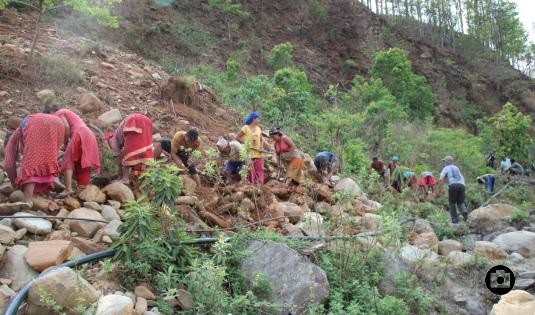

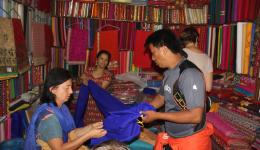
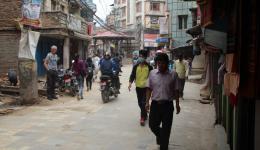
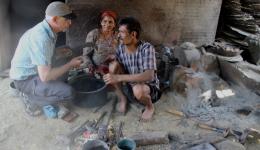
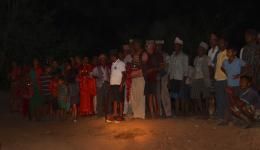
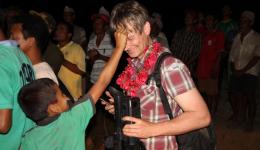
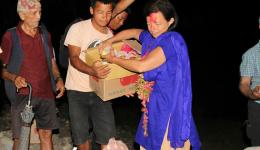
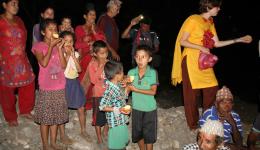
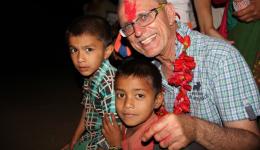
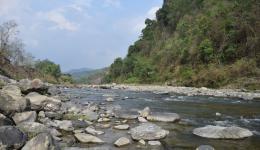
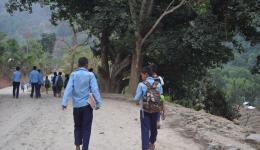
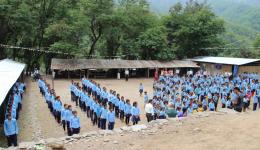
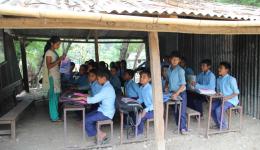
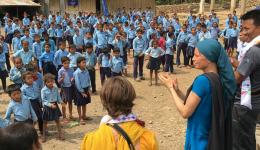
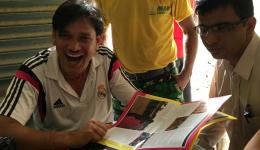
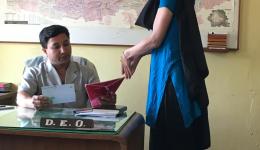
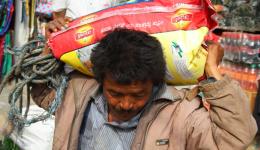
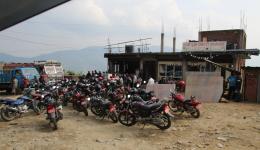
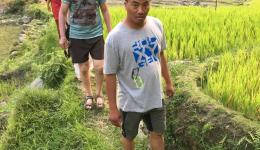
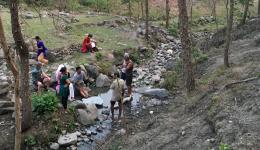
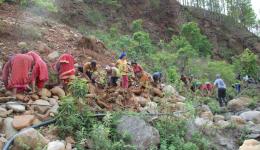
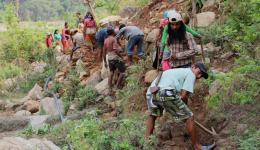
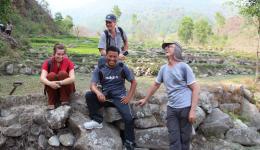
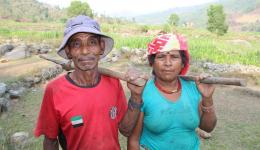
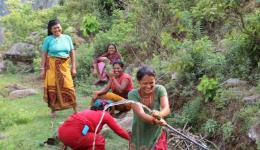
Comments(0)
Add new comment